

Writing Doesn't Have to be a Struggle

- Lessons break down writing into bite-sized pieces so students confidently move step-by-step to complete their writing assignments.
- Repetition of the basics reinforces the concepts until they are learned.
The proven writing program gives you the tools to teach your students how to effectively plan and write a quality essay from scratch, by equipping them with the writing skills needed to easily write a variety of paper and essays.
ORDER NOW: Complete Curriculum Packages (includes 1 set of Student Worksheets)
Need extra set(s) of worksheets? Need just a set of Student Worksheets for a class? ORDER NOW: Student Worksheets Only
This is a writing program I believe any parent could comfortably teach-even those who call themselves “non-writing” parents. Rebecca is a customer service dream, readily and efficiently responding to any questions I’ve had via email or phone.
Heather Sanders, The Pioneer Woman Homeschool Blog
TWF Curriculum Descriptions: Click Here to Order Now
The Write Foundation has 5 levels available. Each level can be completed in 1 or 2 years depending on your schedule and your student’s maturity and ability level.
Jr. High and High School Level Courses
- Does your student struggle to easily write a well-written paragraph?
- Can your student take any topic and develop into a well-written paragraph?
- Your student may be able to write fairly decent paragraphs, but does his or her writing meet at least high school if not college level formal writing standards?
- Well-written papers are logical and easily developed when students are equipped with the right writing tools.
Level 1: Sentence to Paragraph : (Ages 12 - 14, 6th-9th Grade) Students creatively develop descriptive and more complex sentences. They quickly move to writing basic 1-paragraph and then 2-paragraph compositions using the writing process with a variety of brainstorming techniques and outlines. Samples / Assessment Test / Order Now
Level 2: Paragraph Writing : (Ages 13 - 16, 7th-10th Grade) Students improve and develop their paragraph writing skills, while being challenged to quickly grasp more complex pieces of the writing puzzle, and advancing to a basic 5-paragraph college-level essay. Samples / Assessment Test / Order Now
Level 3: Essay Writing (Ages 14 - 18, 9th-12th Grade) Can your student take any topic and independently write a college-level essay easily and successfully? Students gain a solid foundation of the writing process and writing structure so they can take a complicated subject and make it easy to understand through a well-written essay. Essay Writing gives them the skills to confidently write to please any professor. Samples / Assessment Test / Order Now
Elementary Level Courses
Entry level i & ii: well written paragraphs have well written sentences..
Each lesson uses engaging writing activities and games, which develop and advance students' creative writing abilities and other writing skills.
Does your student struggle to write a basic simple sentence? Does your student need to improve his or her sentence writing skills? Entry Level I: Prepare to Write : (Ages 8 – 10, Grades 2-4) Students begin by writing complete basic sentences and quickly develop their basic sentences into creative, more complex sentences using the 9 foundational parts of speech. Samples / Assessment Test / Order Now
Does your student write simple sentences? Does he or she need to begin developing higher level sentence writing skills? Entry Level II: Creating Sentences : (Ages 9 – 11, Grades 3-5) Students continue developing descriptive, informative sentences from basic sentences using grammar and figures of speech. Students learn to avoid common errors people make when casually and formally writing for school and work. Samples / Assessment Test / Order Now
Eight (8) free lessons, a syllabus for each level, free consultations, articles and curriculum information videos are available on this website.
View the syllabus and try free lessons for each level. Print and use the sample writing lessons with detailed lesson plans if you want to try this writing curriculum before you buy it.
ASSESSMENT/EVALUATION TESTS: Determine the right level for your student(s).
- Placement/assessment tests are available to help you determine the right level for your student. /assessment
- Rebecca Celsor is available for free email (rebecca@thewritefoundation.org) consultation to help you determine which level is right for your student(s).
- Get hands-on writing practice using our writing method before you make your purchase. Two (2) free sample writing lessons per level (8 lessons) with student worksheets, teaching instructions with teacher presentation information included, separate teacher presentation pages, and daily schedules are available on this website.
- A syllabus for each of the 4 levels is also available on this website. The syllabi lay out lesson by lesson the writing skills as they are taught, so you can see what types of writing, grammar and figures of speech are covered in each level.
- Articles are also available on this website to help you determine what levels would be appropriate for your children. /age-levels/
New Interactive Digital Format : You type on the Teacher Presentation as your students write on their worksheets. Now a part of each curriculum package in the Additional Resources.
Intimidated about grading? The Write Foundation offers Online Grading .
I am very happy with the results I am seeing. There is noticeable improvement in my son's writing from week to week. To date, this is the most effective writing curriculum I have used in our 13+ years of homeschooling. If you are looking for simple, hands-off writing lessons, this product is not for you. If you want a curriculum that will produce students skilled in all areas of writing, you need The Write Foundation.
Lorie D., The Midlife Housewife
Recent Articles
- Correcting Run-on Sentences
- How Does Skipping the Writing Process Affect your Writing?
- Graduating Homeschooling
- Is My Child Ready for Formal Writing?
- Teaching Spelling
- Evaluating Homeschool Writing Curriculums
- How to Teach Essay Writing
- Why Most Writing Curriculums Fail (and How to Make Sure your Homeschooler Doesn't!)
- Top Five Reasons Students Hate to Write (and How You can Help!)
- College Preparation for Homeschooled Students
H e is like a man building a house, who dug deep and laid the foundation on the rock. Luke 6:48

View, Print, and Practice the Sample Lessons
(We're here to help you teach!)
Now Available!
Free Reading Lists Get your copy today!
Have a struggling writer? Maybe he hates writing? Does your student just need to learn how to write? Long for teacher-friendly lesson plans you can quickly prepare and teach? Desire a writing curriculum your children will enjoy while learning creatively?
- Complete Lesson Plans
- Free Assessment Tests
- Free Reading Lists
- Organization for Writing
- Checklists & Guidelines
- Brainstorm & Outline Forms
Open doors to writing success!
Contact Rebecca . Rebecca Celsor will answer your questions regarding how to easily teach your child to write.
" The girls enjoyed our “writing class time” and were intrigued by the more formal writing style being taught. They enjoyed setting up the required class notebook and loved using the different colored highlighters to dissect both essays and outlines. We noted that the practice sentences expressed strong opinions and the entire curriculum was written from a Christian perspective. The girls especially "

- Course Selection Assistance
- Suggested Age Levels for Homeschool Writing
- Entry Level I - Prepare to Write
- Entry Level II - Creating Sentences
- Level 1 - Sentence to Paragraph
- Level 2 - Paragraph
- Level 3 - Essay
- Free Curriculum Writing Samples
- Example Teaching Videos
- Online Grading Service
- Writing Skills Reference Folder
- How to Present a Lesson
- Grading Writing
- Key Points for Grading Writing
- MindBenders®
- Order Curriculum Packages
- Order Worksheets Only
- Refund/Return Policy
- Selecting Home School Curriculum
- Writing Preparation
- Writing Development
- High School and Beyond
- Homeschool Co-ops
- Homeschool How To
- The Story Behind TWF
- Why Another Writing Curriculum?
- Copyright Information

He is like a man building a house, who dug deep and laid the foundation on the rock . Luke 6:48
Dedicated to equipping God's children with the ability to communicate His Truth to the world.
- Teaching Tools
- Curriculum Ordering
- homeschool writing curriculum
- home school writing samples
- Mind Benders®
- Online Grading
Copyright © 2021 TheWriteFoundation.org
web site design - evolvethebrand.com


Complete Guide to Homeschool Writing Curriculum for Every Budget and Age

Looking for a homeschool writing curriculum that will educate and motivate your child to write with excellence?
It can be a hard road, Homeschool Mama!
Writing is one of the three core subjects (reading and math are the other two) that form the basis of a solid education – which is why it can be so stressful for the homeschooling parent!
We feel the pressure to develop strong writers, but we also want our kids to love writing. It can be hard to achieve both of those things.
Blessedly, there is a mountain of homeschool writing curriculum out there that can fit any homeschool style, education philosophy, budget, and family size!
This blog post is going to be your complete guide to the 12 best and most loved homeschool writing curriculums on the market.
Think of it as a one-stop-shop to explore curriculum you’ve heard of but don’t know that much about – or to discover new curriculum that is just right for your homeschool!
Enjoy and happy homeschooling!
Ultimate Guide To The 12 Best Homeschool Writing Curriculum Options

Below I have provided quick reference information for each curriculum in terms of grade level, materials needed, price, and details.
Price is for new curriculum and according to prices available to me as I write this.
1. IEW (Institute for Excellence in Writing)

For Grades : 1st grade – 12th
What You Need : Teacher’s Guide and Student Book
Price : $55
Details About IEW:
This was the first homeschool writing curriculum that we tried, and I think it truly set an excellent foundation for my then 3rd grader.
Our co-op at the time taught it every year, but I sat down and did the actual lessons and writing with her during the week.
I loved that it did such a thorough job teaching kids how to put a keyword outline together for a structured, low-stress writing experience. As a writer myself, I understand how important an outline is to keep you organized and productive!
IEW is also very big on teaching vocabulary words and encouraging students to use more “interesting words” in their writing. To this day, my daughter still includes lots of adjectives and “strong verbs” in her writing because of her experience with IEW. She also carefully avoids using the “banned words” like “big” and “good” – why use those words when there are so many other more descriptive and colorful word choices out there!
Another fun part of IEW is that you can choose what theme you want your child to use for the year. For example, grades 3-5 can pick from “ Fables, Myths, and Fairy Tales ,” “ Bible Heroes ,” “ Ancient History ,” or” All Things Fun and Fascinating .”
If you are looking to build a strong foundation in writing, I would recommend IEW for an excellent beginning. It was easy to teach, reasonably priced (definitely use the above links to check for used prices on Amazon), and solid.
I have not used the higher levels, but I have often heard it discussed as the gold standard for homeschool writing.
Keep in mind that the IEW grammar program is sold separately.
2. BJU Writing & Grammar

What You Need : Teacher’s Guide and Student Workbook
Price : $110
Details About BJU Grammar and Writing:
BJU Writing & Grammar is the next writing program we tried. When our co-op shut down for the pandemic, I realized I was on my own for teaching writing.
We shifted gears to BJU Press because it bundled together grammar and writing, which would be a big time saver.
My favorite thing about this homeschool writing curriculum is that it teaches the writing process perfectly. My then 4th grader learned the steps of Planning, Drafting, Revising, Editing, and Publishing – steps that she still uses today.
I loved that my kid was being taught to draft an entire piece in one day and that it didn’t need to be perfect! She could just pour out her thoughts on paper or “make the dough” as we called it. And then we would shape the dough during revising and editing later in the week.
This helped very much with her paralysis with writing, because she felt overwhelmed with it being perfect.
She still uses these writing process steps for her writing today and I even still make her editing checklists similar to what the book had so she can edit her own work.
I would strongly recommend BJU Grammar and Writing for strong grammar, time-saving, and high-quality writing.
3. Writing With Ease/Writing With Skill

For Grades : 1st – 12th
What You Need to Buy : Writing With Ease (elementary level) only requires a student workbook. Writing With Skill will require a student workbook and Instructor Text (teacher’s guide).
Price : $25 – $50
Details About Writing With Ease and Writing With Skill:
I love this super gentle writing curriculum from A Well Trained Mind and written by Susan Wise Bauer.
I am on my second round of using Writing With Ease (the elementary level) with my younger children, and I absolutely recommend it as a beautiful introduction to writing.
Every week I read sections of classic stories to my daughter and I ask her listening comprehension questions that she has to answer in full sentences. She thinks it’s just a fun story and talking time with mom, but there is a specific purpose.
This process teaches her what a complete sentence is and what a fragment is – which is key information before you sit down to write.
There is also copy work of classic literature, grammar instruction, and writing original thoughts.
I haven’t used the next levels of this writing program from Susan Wise Bauer yet, but if this quote from The Well Trained Mind is any indicator, you need to check it out!
“We offer a variety of easy-to-use resources for teaching the vital skill of written communication. Our Writing With Ease series teaches elementary students how to transform thoughts into coherent paragraphs. Writing With Skill adds many other skills for middle and high schoolers, such as outlining, research, citation, and the construction of full-length essays in history, literature, science, and other subjects. The Creative Writer helps them write a best-selling novel that will get turned into a worldwide blockbuster movie starring Benedict Cumberbatch, which will enable them to support you in your old age.”
There are four levels of Writing With Ease and three levels of Writing With Skill .
4. WriteShop

For Grades : K – 12th
What You Need to Buy : WriteShop Primary (ages 5-9) requires an activity pack and a teacher’s guide. WriteShop Junior (ages 8-13) can pick from a number of things or bundle them all together: activity pack, teacher’s guide, fold-and-go grammar guide, and time-saver pack. WriteShop 1 & 2 (Middle School/High School) requires a student workbook, teacher’s guide, and dictation/copy work guide.
Price : $41 – $110
Details About WriteShop:
WriteShop is a homeschool writing curriculum that I’ve had my eye on for a long time. In all of my homeschooling blogging circles, I seem to always hear buzz about how incredible this writing program is!
I have done some homework, and it is beautifully laid out, colorful, and so engaging from first sight. It is known for fun activities, engaging writing assignments, and its step-by-step, incremental approach to teaching writing skills.
And as an added bonus, WriteShop focuses on teaching the homeschool parent how to teach writing – in an easily understandable way.
The lower levels enjoy fun, hands-on writing activities to get kids excited about writing! I love that there are supply lists in the teacher’s guides (all regular things you’d have in the house) to teach a writing lesson!
And the assignments would catch any kid’s attention: science fiction, adventure, and mystery story writing!
There are also additional resources on the website that you can use alongside WriteShop or as a writing supplement to your current curriculum. Check out StoryBuilders and Writing Prompts for some fun springboards for creative writing!
The higher levels allow students to work more independently, and there is even a video course offered.
It may be difficult to know which level you need to start with, so definitely check out the WriteShop placement test .
To find out more about Writeshop, head on over to their website or check out this full review from MeaningfulHomeschooling .
5. BraveWriter

What You Need to Buy : BraveWriter offers bundles of their curriculum that covers multiple kids, but they are very relaxed about what you “need.” It is cheaper overall to buy the bundle, but you can also just start out with one of their books, and go from there. Online classes are also offered. They are taught by homeschool parents, who are also published authors.
Price : $50 – $229 (bundle price)
Details About Brave Writer:
Brave Writer is definitely the most unique writing curriculum that I have researched yet.
This writing program was written by Julie Bogart, a homeschool mom who has 5 homeschool graduates to her credit.
Brave Writer promotes a “Brave Writer Lifestyle” that focuses on raising kids in a language-rich environment where they will learn to not just be a good writer – but to love writing. There is a large focus on reading great books aloud and a weekly poetry tea time (I love that!), and less of a focus on structured lesson plans and “you have to write this many sentences.”
Parents are encouraged to purchase one bundle and adapt it to teach all the grades in their homeschool. That is a huge time saver!
Learn more at the Brave Writer website or check out this full review at This Simple Balance .
6. Wordsmith

For Grades : 4th – 12th
What You Need to Buy : Each level only requires one book. Level 2 suggests buying a helpful teacher’s guide.
Price : $18
Details About Wordsmith :
Wordsmith is an economical homeschool writing curriculum from Janie B. Cheaney, a published author of six books.
She provides a simple, easy-to-use curriculum that is broken up over three main books.
Wordsmith Apprentice (4th-6th grade) :
“All the practicality, humor and fun of Wordsmith, but written for the younger student, ages 9-12. An easy to use writing course encouraging students to develop their writing skills as they participate in every role on a newspaper staff: editor, reporter, writer, etc. Children develop a love for writing as they express themselves through sentence and paragraph writing, persuasive writing, and much more. The third edition has a larger font and cleaner type for easier reading. With added examples and delightful new illustrations, developing writing skills is made fun and easy.”
Wordsmith: Building Skills (6th-9th grade) :
“Confidence is what most young writers lack, and Wordsmith is designed to lead them to the place where they can read over their own work and think, “Hey—that’s pretty good!” Wordsmith is the core book in the series, the one that every student from age 12 and up should complete, especially if their writing skills lag behind the recommended level.”
Wordsmith Craftsman (9th-12th grade) :
Part Three of Wordsmith Craftsman is a master class on The Essay, pulling together thought, organization, logic, personal connection, and style. A well-written essay is rightly considered the mark of an educated, thoughtful man or woman. A student will learn how to apply the TOWER process (Think, Organize, Write, Evaluate, and Rewrite) to a variety of essay types, namely descriptive, narrative, expository, critical , and persuasive . The expository section includes a primer on the all-important first step in writing research papers (which will save a lot of freshman-comp angst later!).
There are sample lessons for all three of their books. Hop on over to the Wordsmith website to check them out and see if this homeschool writing curriculum best fits your homeschool!
7. Clear Water Press

For Grades : 6th – 12th
What You Need to Buy : Student Kit and matching DVD or Cloud Access
Price : $258 – $343
Details About Clear Water Press :
ClearWater Press is the perfect writing curriculum for aspiring authors! Students are taught this creative writing course through in-depth video lectures while they work on year-long writing projects.
Below are the details of their three main curriculum books.
Cover Story (6th-9th grade) :
“The Cover Story magazine writing program works with your student, not against them. Award-winning author Daniel Schwabauer takes 6th–9th graders on a creative journey writing their very own magazine through engaging videos. The optional grammar lessons make Cover Story a full English Language Arts! Choose to watch Cover Story lessons on Cloud streaming or DVDs.”
One Year Novel (9th-12th grade) :
“Author Daniel Schwabauer takes 9th–12th graders under his wing to write their own compelling original novel—for a high school English credit! His unique approach begins where many writing courses don’t go at all, with an exploration of how Story works . A creative community and support resources help students thrive. Video lessons now available on Cloud streaming only.”
Byline Journalism and Essay Writing (9th-12th grade) :
“In the Byline journalism and essay writing program, students step into the role of a 1930s-era newspaper reporter, training under Editor-in-Chief Daniel Schwabauer, who takes them under his wings to teach them everything he knows. Before they even realize it, they master the dreaded high school essay! Choose to watch Byline video lessons on Cloud streaming or DVDs.”
Head on over the Clear Water Press website to find out more information and see sample lessons !
8. Writers in Residence: Apologia

What You Need to Buy : All in One Student Text and Workbook, answer key, additional workbooks for teaching more than one child
Price : $21 for one student
Details About Writers in Residence :
I have to be honest with you all, I had no idea that Apologia offered anything besides science! Apparently, they do offer a full language arts program through their Writers in Residence series!
I love that it is designed to be used with multiple children at the same time – a huge time and money saver for homeschoolers with multiple kids!
Your students will learn about everything from sentence structure to short stories to persuasive essay writing – all through a Christian worldview lens.
“Thorough and systematic, six units and twenty-four modules are included, with lively and colorful lessons building on previously-taught concepts, skills, and terms. The easy-to-use, “all-in-one” Student Text and Workbook features an engaging tone that’s written directly to the student. Each unit opener includes a focus on a Christian writer, unit overview, and rubric; units include models from professional writers for students to study and use as an inspiration for their own writing. Modules integrate clear, engaging instruction with sidebar notes and a variety of exercises. Assignments cycle through four types of writing tasks: I Remember: assignments focused on the personal narrative I Imagine: creative writing assignments such as short stories, poetry, and novels I Investigate: research skills assignments I Think: tasks that teach opinion and argument writing, including persuasive and argument writing”
To find out more, check out Rainbow Resource, Christianbook.com, or Amazon for reviews, sale prices, and more details!

What You Need to Buy : Student Text and Teacher’s Guide
Price : $45
Details About Jump In :
Jump In is a budget-minded homeschool writing curriculum focused on getting middle school students ready for the expectations of high school writing. It has a gentle, low-stress format that is focused on independent student writing.
“What to do when high school is just around the corner and your middle schooler HATES to write? Jump In: Middle School Composition covers all the basics needed for high school writing in an engaging fashion; humor sneaking in occasionally. Daily lessons will take 5 – 20 minutes to complete. Instruction is written directly to the student and sometimes involves Bible stories or characters. Lessons might start with 10-Minute Writing Plunges that are designed to engage reluctant writers or appeal to eager writers. Or the Plunges can be a break from other assignments or a course by themselves. Plunge prompts are given M-Th with no grading (or turning in). On Friday, the student chooses which one they like best, proofreads it, and gets it ready to hand in.
10. Essentials in Writing

For Grades : K-12th
What You Need to Buy : Student Workbook, Instruction Manual, and access to video lessons
Price : $69-$89
Details About Essentials in Writing :
Essentials in Writing is a video-based course that will take a lot of stress off the busy homeschool parent or the parent who is intimidated to teach writing.
The format is rather simple. The student watches a video (DVD or streamed) and then completes the corresponding workbook pages. The parent is responsible to look over the work and discuss it with the child.
There are also fun hands-on activities, such as time capsules, that will get kids excited and engaged with the writing process.
“Looking for a complete English course for all grade levels that is well organized, thorough in explanation, effective in teaching and easy to use in a homeschool or group setting? Then consider Essentials in Writing! Video instructor Matthew Stephens taught English at the elementary and high school levels for years, and he used his experience to good effect in authoring this course. Video lessons featuring Mr. Stephens are the essence of the course, with supporting workbook activities as follow-up. Mr. Stephens is doing the heavy lifting of presenting and explaining the material, leaving only clarification and follow-up questions to the home instructor. Lessons are presented in bite-sized chunks, so each day’s lesson features one main point. The quality of the video and audio is good, showing Mr. Stephens teaching in front of a classroom on a white board. For younger grades, the teacher and student would watch the videos together, then discuss to make sure that the student grasps the main ideas of the presentation. Students at more advanced grades can watch the videos on their own (as the instruction is always directed to the student), leaving only follow-up discussion of the material and assignment to the teacher. Of course, the instructor should preview the video material to ensure knowledge of the material and consistency of approach in working with the student.”
Check out the Essentials in Writing website for more information, sample lessons, and videos!
11. Writing Strands

For Grades : 5th – 12th
What You Need to Buy : One Student Book and One Teacher’s Guide (One teacher’s guide covers all 6 levels of Writing Strands)
Price : $40
Details About Writing Strands :
Writing Strands is a full language arts and writing curriculum from Master Books. It is a newly revised edition that has streamlined and improved on the older version.
The curriculum includes a Beginner, Intermediate, and Advanced level and has a Christian Worldview.
You will find clear daily schedules, opportunities for independent work, and writing lessons based on the analysis of literature and scripture.
Here is a snippet of the curriculum description for Writing Strands Book 2:
“This resource covers 180 days of instruction and includes a weekly lesson schedule, student worksheets, and an answer key for the objective questions in the reading lesson portion. Each week alternates between writing lessons and reading lessons; for their reading, students will read biblical passages as well as books chosen and assigned by the parent. A weekly lesson schedule is also included. This comprehensive approach will help students begin to develop a solid foundation in communication as they focus on basic, creative, organizational, and descriptive writing skills. This course alternates a week of writing exercises with a week of reading and discussing books and ideas.”
12. Writing & Rhetoric

For Grades : 3rd and up
What You Need to Buy : Student Edition and Teacher’s Edition
Price : $40 (for one semester)
Details About Writing and Rhetoric :
Writing & Rhetoric is an award-winning series of writing curriculum books.
Each book will only cover one semester, so if you stay on track, you will be doing 2 books per year.
Books 1-6 are for grades 3-6. Books 7-12 are marked for grades 6 and up.
Here is a description of this overall curriculum:
“Writing needs to be taught just like any other subject, and letting students be ‘free’ to write without a model is often letting them jump in the deep end without learning to swim first! Writing & Rhetoric assumes students learn best by first reading excellent literature and then imitating those writers. Students who complete the entire program will learn to write narrative, expository, descriptive, and persuasive essays while developing their own unique style. Each exercise is designed to teach a skill that can be employed across all subjects. Skills are arranged from simple to complex, and the cumulative nature of each chapter reviews skills from earlier in the book, helping students to build a solid foundation of writing skills.”
Recap: Best Homeschool Writing Curriculum
I don’t know about you, Homeschool Mama, but it’s going to be very difficult to choose between all of these writing curriculums!
I do hope that you found a few that you want to research, dig deeper into, and hopefully use in your homeschool.
Of course, this is not a complete list of all writing curriculum – I would need a whole book to write out everything that is out there!
Please drop a comment and share if you have a favorite writing curriculum that I didn’t list above!

Leave a Reply Cancel reply
Your email address will not be published. Required fields are marked *
Homeschool Writing Curriculum: 17 Actually Engaging Options
The specifics of a writing curriculum will vary, but a comprehensive curriculum should cover a progression of skills, increasing in complexity and sophistication from elementary to high school. Here's which homeschool writing programs best prepare kids to be great writers.

Prisma is the world’s most engaging virtual school that combines a fun, real-world curriculum with powerful mentorship from experienced coaches and a supportive peer community.
The Power of Being a Great Writer
Living in an era dominated by rapid technological advances and artificial intelligence, it’s harder than ever, as educators and homeschooling parents, to figure out what skills kids will need to succeed in the future.
For example, why should we care about writing in the age of AI? Will technology make traditional skills like writing obsolete? On the contrary, at Prisma we believe the rise of AI makes writing more important than ever . While AI can generate text and even mimic human-like writing, it lacks the nuance, critical thinking, and empathy that are the hallmarks of human communication. The best human writers will always be able to use their command of language arts to influence others.
Plus, the practice of writing skills is important for children’s brain development. As Flannery O’Connor aptly stated, "I write because I don't know what I think until I read what I say." The writing process enables us to crystallize our thoughts, stimulating disciplined and critical thinking —a skill that remains irreplaceable by AI. Whether it's a scientist explaining a complicated theory or an entrepreneur pitching their company to investors, the ability to articulate thoughts clearly & with originality is indispensable.
Moreover, writing fosters empathy . Writing, especially creative writing, allows us to imagine and understand different perspectives—an emotional skill that even the most advanced AI lacks. Empathy is vital for personal relationships, teamwork, and any profession involving human interaction.
Furthermore, writing teaches resilience . It's a journey filled with trials and errors. Children learn to handle setbacks, receive criticism, while continuously revising their work, skills that instill adaptability and persistence.
And it's a skill where we see a worrisome trend. According to a recent National Assessment of Educational Progress (NAEP) report, only 27% of students in America achieved or exceeded proficiency in writing. This statistic rings alarm bells about the declining writing skills among our children.
As we guide our children's learning paths at home, our responsibility extends beyond teaching writing. Our aim is to help them appreciate writing as a tool for thinking, empathizing, and persevering. Despite the rise of AI, the art of writing is here to stay. It's not just a skill, it's a compass—a compass that will guide our learners to navigate the evolving landscape of the future with thoughtfulness, empathy, and resilience.
Selecting a Homeschool Writing Curriculum: Key Factors
Choosing a homeschool writing curriculum is a crucial decision, as it will greatly impact your child's development of writing skills. Here are some key factors to consider:
- Your Child’s Interest in Writing: Is your child a very reluctant writer who may need an online app with gamified elements or lots of varied, hands-on worksheets to stay interested? Or is your child a voracious reader & enthusiastic future author who might do better with open-ended journaling, creative writing prompts , and research papers on topics they’re interested in?
- Your Child’s Learning Needs & Style: If your child has any learning differences, such as dyslexia , ADHD, or autism, you should evaluate any possible curriculum for accommodations and supports. Also consider the way your child prefers to learn. Do they like variety or lots of structure? Pen and paper or digital? Visual, audio, or hands-on?
- Level of Interaction: Consider the level of interaction the curriculum offers. Does it provide opportunities for discussions, peer review, or one-on-one feedback sessions? Interaction can often boost motivation and improve learning outcomes. You could even look for programs that offer live online instruction (we share a few options below).
- Alignment with Goals: What are your goals for your child's writing education? Do you want them to homeschool permanently, or do you hope to have them transition to a more traditional high school or college? If so, make sure the curriculum you choose prepares your learner to write aligned to Common Core standards , and make sure you feel comfortable supporting them.
- Flexibility: Look for a curriculum that allows flexibility in pace and approach. Every child is unique and might not fit into a rigid learning structure.
- Incorporation of Writing Process: The curriculum should teach the writing process – brainstorming, drafting, revising, editing, and publishing. This will help your child understand that good writing often involves rewriting and refining.
- Grammar and Mechanics: While the primary focus might be on developing expressive and organized writing, the curriculum should also help your child learn the grammar and mechanics necessary for clarity and correctness. But we personally feel at Prisma that too many grammar drills can be counterproductive, and many writing experts recommend teaching grammar mostly in the context of a real writing assignment after elementary age.
- Integration with Other Subjects: Writing is a skill that can and should be integrated into other subject areas. A curriculum that encourages writing across subjects can foster more meaningful learning experiences. At Prisma, all writing happens in the context of our fun interdisciplinary themes , like Cities of the Future (where kids wrote a speech proposing a new law for their dream city), Build a Business (where kids wrote a business pitch), and Unsolved Mysteries (where kids wrote research-driven podcast & video scripts for a real life mystery).
Writing Curriculum Guidelines by Grade Level
The specifics of a writing curriculum will vary, but a comprehensive curriculum should cover a progression of skills, increasing in complexity and sophistication from elementary to high school. Here's a broad guideline to assess curriculum options, or if you feel like building your own curriculum from scratch:
Elementary School Writing Curriculum
At Prisma, elementary school writers focus on developing key skills in our live Literacy Labs & completing writing missions connected to our project-based themes. Content covers:
- Sentence Structure: Understanding the basic elements of a sentence, like nouns, verbs, and adjectives, and how to construct simple sentences.
- Paragraph Writing: Introduce the concept of a paragraph, topic sentences, and supporting sentences. Graphic organizers often help in this process.
- Basic Grammar and Punctuation: Understanding the rules of capitalization, the usage of periods, question marks, and exclamation points.
- Story Writing: Introduction to narrative writing, creating simple stories with a beginning, middle, and end.
- Writing for Different Purposes: Practice writing informative, persuasive, and narrative pieces.
Middle School Writing Curriculum
Middle school Prisma learners build up to longer writing assignments to prepare for high school writing, and increasingly complete multiple revisions and use peer feedback to perfect their work. They build skills of:
- Advanced Grammar and Punctuation: Dive deeper into the intricacies of grammar and the use of more advanced punctuation marks like semicolons and colons.
- Essay Writing: Understanding essay structure, crafting thesis statements, and creating coherent arguments.
- Narrative Writing: Developing complex narrative techniques, such as point of view, character development, plot structure, and dialogue.
- Research Skills: Learning how to conduct research, evaluate sources, and incorporate evidence into their writing.
- Revision and Editing: Strengthening the ability to revise and edit their own work for clarity, coherence, and correctness.
High School Writing Curriculum
Prisma high school students develop real-world writing assignments for real audiences, preparing to share their writing with the world and developing college-ready writing skills:
- Advanced Essay Writing: Enhancing argumentative, expository, and analytical writing skills. Practice writing longer, more complex essays.
- Literary Analysis: Writing essays that analyze literature for theme, symbolism, and other literary devices.
- Research Papers: Learning to write comprehensive research papers with proper citation and referencing.
- Persuasive Writing: Developing the ability to write persuasively, shaping arguments and using evidence effectively.
- Creative Writing: Exploring different creative writing genres like poetry, short stories, and script writing.
- College Application Essays: Learning to write personal essays that can be used for college applications.
- Critical Thinking: Developing the ability to critique, analyze, and evaluate arguments in writing.
Sign up for more research-backed guides in your inbox
- Prisma is an accredited, project-based, online program for grades 4-12.
- Our personalized curriculum builds love of learning and prepares kids to thrive.
- Our middle school , high school , and parent-coach programs provide 1:1 coaching and supportive peer cohorts .
Online Homeschool Writing Programs
Live online writing courses.
If you don’t feel comfortable teaching or designing writing curriculum yourself, an online course can be a great way to give your learner an interactive, high-quality language arts curriculum.
In a nutshell: Marketplace for online courses in all subjects, including writing. You can read teacher reviews and course descriptions to get a good feel of which classes will work best for your child (and try a bunch to see what works!)
Grade Levels: K-12 and above
Cost: Depends on the length, format, and teacher. Expect to pay around $10/class for most offerings, and up to $50/class for private, 1-to-1 tutoring.
Format: Depends on the class and instructor. Some courses may only be live sessions, and others may include asynchronous materials like worksheets, rubrics, and journal prompts.
Pros: Low-lift for parents, high interactivity; and often fun, engaging topics like Comic Strip Stories or Fan Fiction
Cons: If you switch instructors frequently, your child may have gaps in their knowledge or struggle to build momentum with one writing process
Written Out Loud
In a nutshell: Written Out Loud’s three core principles are transforming how kids learn - and love - to write. Prisma partnered with this organization the past two years and we can say that kids LOVE learning to write with this program. Kids write a whole book as part of a team.
Grade Levels: Ages 10+
Cost: Fee per class or camp. Current summer camp offerings are $529.
Format: In virtual courses (or in-person if a homeschool group reaches out to form a class together), kids work in teams to “break” a story in the style of Hollywood writers (decide verbally as a team what the story will look like) and then write their portions, ending in the publication of a full-length book!
Pros: Helps kids love writing, low-lift for parents, high interactivity
Cons: Doesn’t teach more traditional or “academic” forms of writing, so likely will need to be a supplement.
Prisma & Other Online Private Schools
Some homeschooling families choose to enroll in comprehensive online schools like Prisma, especially as their children get older and need more teacher support or rigorous curriculum. Although these options do charge tuition, they offer a comprehensive, intentional, expert-driven approach to academics (including writing) while still offering the personalization, flexibility, and environment of homeschooling.
Best Online Writing Apps & Websites for Homeschoolers
Choosing an online program is great if you want something your learner can do at their own pace with minimal supervision from you. These programs can also be great at motivating learners by providing gamified elements (like points, badges, and achievements).
Essentials in Writing
In a nutshell: Former schoolteacher Matthew Stephens’ popular online program delivers direct instruction & writing practice aligned with the traditional way of teaching writing.
Grade Levels: K-12
Cost: $69-89
Format: A video-based online course with corresponding workbooks
Pros: Low-lift for parents with a consistent structure
Cons: May not be enough variety or interactivity for easily bored learners
Night Zookeeper
In a nutshell: A highly engaging game-based online world for kids to explore writing through mini games, interesting writing prompts, and drills
Grade Levels: Ages 6-12
Cost: Subscription costing about $9-13/month, depending on if you pay annually or monthly
Format: Learners sign on to the platform and explore the online activities freely. Parents can view insights into their progress on the back-end.
Pros: Both reluctant and enthusiastic writers tend to LOVE this platform, and the subscription model makes it easy to try out.
Cons: Doesn’t offer as much instruction as more traditional programs.
In a nutshell: No Red Ink is used in 60% of school districts and although the platform is primarily built for teachers, homeschool parents can register for teacher accounts and provide their children access to this interactive, comprehensive writing program.
Grade Levels: Grades 3-12
Cost: Free version, plus a premium version with additional features
Format: A mix of targeted exercises to help students master sentence structure & grammar, scaffolded writing and revising activities for a range of genres, and diagnostics & quizzes to assess your learner’s skills
Pros: Research-driven, interactive, and incorporates learner interests (kids take a fun quiz at the beginning to tailor the curriculum to what they like to write about), plus built-in assessment (a rarity for writing platforms!)
Cons: Since it’s built for teachers, may not be user-friendly for solo homeschooling parents
Online Grammar & Comprehension Practice
At Prisma, we use grammar apps to supplement our more in-depth writing assignments. Some of our favorites are:
- IXL : We like their initial diagnostic and that you can assign individual skills to learners to practice. The format is not the most exciting or engaging, though.
- Freckle : Elementary school-age writers enjoy the gamified elements of this math & language arts platform.
- Quill : Built around the research-backed strategy of sentence combining & revising as a way to learn key grammar and mechanics, this tool is both free and highly effective (though it may get boring if used too often!).
Best Traditional Homeschool Writing Curricula
Brave writer.
In a nutshell: Brave Writer is a writing curriculum designed to help children discover their own unique voice in writing. It emphasizes creativity and individuality, incorporating various elements of language arts such as grammar, spelling, literature, and writing. This curriculum is by far the most popular one with Prisma parents!
Grade Levels : Pre-K to 12th grade
Cost: Individual online classes range from $99 to $199 per course. Home study courses are available from $79 to $149.
Format: Online classes, home study courses with lesson plans and teacher’s guides, and resources for self-study. The courses take a unique approach, focusing on having lots of conversations before getting writing out on the page.
Pros: The curriculum is flexible and customizable to meet the needs of each student. It also encourages a positive attitude towards writing, reducing stress and resistance. It’s great for engaging and empowering young writers.
Cons: The less structured format may not work for all families. Parents may need to be more involved and excited about teaching writing to ensure progress and there is no built-in evaluation or assessment.
The Institute for Excellence in Writing (IEW)
In a nutshell: IEW is a tried-and-true homeschool curriculum option that employs a method that builds writing confidence and competence. It uses a structured and systematic approach, focused on helping students create quality writing pieces.
Grade Levels: K to 12th grade
Cost: The cost can range from $19 for single items up to $249 for a comprehensive level course.
Format: Mostly DVD-based courses, workbooks, and some online classes.
Pros: Provides clear instruction and step-by-step methods that are easy to follow. It is suitable for a variety of learning styles and abilities. The curriculum covers a broad range of writing styles.
Cons: It can be perceived as rigid by some and may stifle creativity for others. It is more traditional, we have found, than many Prisma parents are looking for. It might be too intensive for students who are not used to structured learning.
Classical Composition
In a nutshell: Based on the ancient principles of storytelling and rhetoric, Classical Composition is a rigorous writing program that leads students step-by-step through the process of writing. If you resonate with the classical approach to homeschooling, you’ll likely be drawn in by this approach.
Grade Levels: 4th to 12th grade
Cost: The cost can vary, but most books range from $15 to $30. DVDs range from $55 to $85.
Format: Textbooks and DVDs.
Pros: It provides a thorough, rigorous program that can help students become proficient writers. It's ideal for parents who prefer a traditional, structured approach to teaching writing, similarly to IEW.
Cons: According to curriculum reviews, it can be challenging and time-consuming. Some students may find it too rigorous or not creative enough.
In a nutshell: WriteShop is a writing curriculum that helps parents teach writing to their children in a step-by-step manner. It focuses on both the creative and mechanical aspects of writing.
Cost: Books and resources range from $7 to $50. Full-set curriculum kits range from $120 to $160.
Format: Books, digital downloads, and online resources.
Pros: The curriculum is easy to use and provides parents with detailed lesson plans. It encourages more creativity than some of the traditional options above while still teaching the technical aspects of writing.
Cons: Some parents have found it to be too teacher-intensive. It requires more preparation than other programs.
Writing Strands
In a nutshell: Writing Strands provides a step-by-step approach to teaching writing, focusing on a broad range of skills such as creative writing, report writing, composition, and critical thinking.
Grade Levels: 2nd to 12th grade
Cost: Individual books cost about $20 each.
Format : Books.
Pros: Even though it’s step-by-step, it is flexible and can be adapted to suit individual student needs. It's also affordable.
Cons: It lacks extensive grammar instruction, and some parents find it lacks depth in certain writing skills. The book-only format may not work for some kids who need more varied types of assignments.
New York Times Writing Curriculum
In a nutshell: This is a modern, real-world-focused curriculum, drawing from The New York Times resources. It emphasizes critical thinking, research, and journalistic writing skills.
Grade Levels: Middle school to high school
Cost: The online resources from The New York Times are often free, but for detailed curriculum materials, cost can vary.
Format: Online, leveraging articles, essays, and multimedia from The New York Times.
Pros: It offers contemporary, engaging, and relevant content. It helps students understand and engage with current events. Great for developing research and critical thinking skills.
Cons: Less emphasis on creative writing. The content might be advanced for younger students. Parental guidance might be necessary due to potentially sensitive topics.
BJU Press Writing & Grammar
In a nutshell: BJU Press Writing & Grammar is a Christian-oriented program that emphasizes grammar and the writing process, incorporating both traditional and creative assignments.
Grade Levels: 1st to 12th grade
Cost: Subject kits can range from $100 to $150, while individual books can range from $15 to $40.
Format: Textbooks, workbooks, and tests.
Pros: The program provides a comprehensive approach to teaching grammar and writing. It's straightforward and structured, providing detailed lesson plans.
Cons: Some parents have found the curriculum to be too rigid and not engaging enough. The Christian worldview integrated throughout the material may not be appealing to everyone.
Well-Trained Mind
In a nutshell: Based on classical education principles, the Well-Trained Mind approach guides parents in crafting a rigorous, comprehensive homeschool curriculum.
Cost: The core book "The Well-Trained Mind" costs around $20 - $30. Other resources' costs vary.
Format: Books and online resources.
Pros: It provides a detailed, rigorous roadmap for classical education at home. It is highly customizable, allowing parents to adapt to their children's learning style and interests.
Cons: It requires significant time and effort from parents. The approach may be too rigorous or structured for some students.
Does Your Writing Curriculum Prepare Your Kids for the Real World?
At Prisma, one of our learning values is that education should prepare learners for the real world . 98% of Prisma parents say that our school does a better job preparing their learner for the real world than their last school. “The real world problem solving the learners do is unlike anything they do in more conventional schools,” says one parent. “If anyone tells you kids aren't ‘ready’ to consider meaningful topics like the world refugee crisis, neurodiversity, building a business, or scientific research, don't listen!”
When kids see why what they’re learning matters, they’re much more motivated and engaged . When we compartmentalize subjects, we make it unclear for learners how those subjects are used in the real world. When the only writing assignments you are given in school are to write 5-paragraph essays only your English teacher (or parent!) will read, you’re unlikely to grasp why writing is an essential skill in so many careers. Imagine if, instead, you’re asked to write a product pitch for an invention you developed to solve a real-world sustainability problem, like our learners did for the Biomimicry Youth Design Challenge in our interdisciplinary theme Wild Inventions . Prisma learners are still taught foundational writing skills, they’re just asked to apply them to real world problem-solving in an interdisciplinary way.
Join our community of families all over the world doing school differently.
Want to learn more about how Prisma can empower your child to thrive?
More from our blog
Recommendations.
Prisma Newsletter
BEST Homeschool Writing Curriculum Picks // Options 2024
- August 9, 2023
- Homeschool Curriculum & Reviews
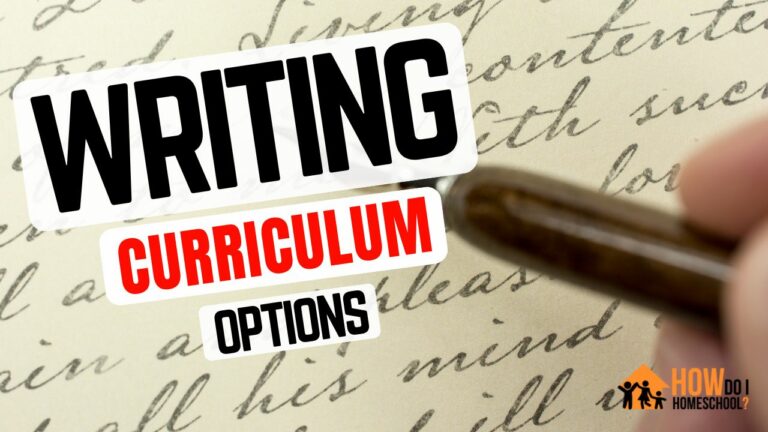
When it comes to homeschooling, one of the essential skills parents strive to teach their children is effective writing. The ability to communicate thoughts, ideas, and stories in a coherent and engaging manner is a cornerstone of education. As such, selecting the right homeschool writing curriculum becomes a crucial decision for homeschooling families. In this article, we will delve into some of the top writing curriculum options available, each offering a unique approach to cultivating strong writing skills.

I hope you enjoy reading this blog post. If you want to do my course on how to homeschool, click here .

BJU Press Writing Curriculum
BJU Press is a well-loved and popular homeschool curriculum. They offer a comprehensive homeschool writing curriculum for all grades , fostering essential skills in effective communication.
Through a focus on writing and grammar, students enhance their language mastery, expand their vocabulary, and learn to contextualize words.
The curriculum’s holistic approach extends to literature appreciation, guiding students to read literature through a biblical lens and equipping them to handle objectionable elements biblically.
BJU Press Literature introduces diverse genres, hailing from various cultures, nurturing critical thinking skills and an understanding of literary techniques in Scripture.
This integrated program cultivates well-rounded communicators equipped with language precision, analytical acumen, and an ethical framework, ensuring their readiness for both academic and life endeavors.
Check out their program here .
A Gentle Feast Manuscript Writing
A Gentle Feast presents the enriching “100 Gentle Lessons in Manuscript Handwriting” program, thoughtfully tailored for children around the age of 6 who are prepared for formal handwriting instruction.
Drawing inspiration from Charlotte Mason’s educational philosophy, the curriculum encapsulates the essence of short lessons, fundamental strokes, and gradual progress.
Infused with the artistic beauty of classical paintings, poignant poetry, and captivating coloring pages, this program transforms handwriting into an engaging and holistic learning experience.
With a strategic approach, the curriculum commences with lowercase letters, enabling students to familiarize themselves with the most frequently used characters in reading and writing.
Notably, the program accommodates left-handed learners, with its unique top-bound design featuring sample letters on both sides of the handwriting lines.
By teaching letters in stroke groups, the program promotes effective muscle memory, facilitating the acquisition of elegant handwriting skills.
Through “100 Gentle Lessons in Manuscript Handwriting,” A Gentle Feast skillfully combines artistic inspiration, pedagogical wisdom, and thoughtful design to nurture a child’s journey towards handwriting mastery, in alignment with Charlotte Mason’s educational principles.
Schoolhouse Teachers 34 Week Writing Program
The Writing Life: Learn to Write Well homeschool course offered by Schoolhouse Teachers provides an essential platform for students to cultivate concise, clear, and influential writing skills, irrespective of their future career paths.
With a comprehensive duration of 34 weeks and tailored for grades 9-12, this text-based program underscores the universal importance of effective written communication.
By focusing on the art of writing and its impact, the curriculum equips students with the tools to convey ideas powerfully.
Minimal supplies are required, with access to corresponding lessons on SchoolhouseTeachers.com and a journal for note-taking and research.
The course’s structure is intuitive, guiding students to download lesson plans and lesson files from the Class Lessons section, enabling a gradual and organized progression through the curriculum.
Through “The Writing Life,” students embark on a transformative journey that enriches their writing abilities, fostering proficiency in articulating thoughts and emotions with clarity and precision.
Creative Writing with ABeka
ABeka introduces students to the diverse and captivating facets of the English language through its Creative Writing program.
This comprehensive curriculum embarks on a journey encompassing exquisite penmanship, the art of figurative language, and the eloquence of poetry, allowing students to refine both the appearance and content of their writing.
Rooted in the belief that writing reflects observation, ABEKA empowers students to keenly observe their surroundings and translate these observations into eloquent prose.
The curriculum equips students with a range of literary tools, including various poem forms, alliteration, and metaphors, enhancing their ability to recognize and adeptly employ these elements.
With 17 penmanship tests and an array of creative writing exercises, this text not only hones students’ writing skills but also fosters a deeper appreciation for the art of expression.
Through ABEKA’s Creative Writing program, students are guided to master the intricacies of written communication, from the aesthetic allure of penmanship to the captivating depths of figurative language, ultimately nurturing a well-rounded and skilled approach to the craft of writing.
Institute for Excellence in Writing (IEW)
The Institute for Excellence in Writing (IEW) stands as a respected institution dedicated to fostering proficient writers through a full writing curriculum.
Founded by Andrew Pudewa, IEW prioritizes effective communication skills by providing tailored writing programs for various age groups.
From early elementary to high school, IEW’s structured approach equips students with essential writing tools, encompassing organization, reasoning, and persuasive techniques.
IEW’s emphasis on teaching diverse writing forms empowers students to master reports, essays, narratives, and more.
The integration of literature study enhances comprehension and analytical abilities while cultivating a profound appreciation for language.
By offering resources for educators, IEW ensures a holistic writing education that prepares students for academic success and confident expression.
Check out their program here or find a review of IEW here..
Easy Peasy All-in-One Homeschool
Within the framework of Easy Peasy All-in-One Homeschool , students are provided with a foundational free homeschool writing curriculum course that focuses on developing handwriting skills.
This free course progressively guides students through the process of mastering both letters and numbers.
As the course unfolds, students advance from learning individual letters and numbers to composing words, sentences, and more complex written forms by the culmination of the academic year.
The writing curriculum includes a set of printables and workbooks designed to facilitate offline learning or complement the online course.
These resources offer flexibility in how students engage with the materials, catering to different learning preferences and environments.
Easy Peasy All-in-One Homeschool’s approach to writing underscores its commitment to laying down strong foundational skills.
By enabling students to build proficiency in handwriting, the program equips them with an essential skill set that serves as a cornerstone for future writing endeavors.
Whether students are at the beginning stages of letter formation or progressing towards constructing sentences, this writing option ensures a structured and gradual development of writing abilities.
AOP Writing Options
Explore opportunities to enhance your homeschooler’s reading and writing skills with AOP language arts courses and electives.
This selection encompasses a range of options suitable for various grade levels and curricula.
Monarch’s online platform integrates reading, writing, listening, and speaking lessons, while elective choices like American Literature, British Literature, and Speech are available for grades 3-12.
The LIFEPAC print worktexts offer self-paced learning of essential language arts concepts across grades K-12.
Horizons print workbooks present customizable word lists and writing assignments, with phonics-based programs like Spelling & Vocabulary and Phonics & Reading contributing to comprehension enhancement for grades 1-3 and K-3, respectively.
Writing Strands by Master Books
Experience the comprehensive homeschool writing curriculum offered by Writing Strands, a composition series interweaving grammar instruction seamlessly.
This user-friendly program features a convenient daily schedule that requires 30 to 45 minutes per lesson, five days a week, effectively saving preparation time.
The systematic breakdown of writing instruction ensures accessibility, covering dialogue, reporting, persuasion, story writing, and more in Beginning levels, progressing to sentence structure, paragraph usage, point of view, and character creation in Intermediate stages.
Advanced levels refine skills in writing reports, short stories, essays, while also exploring literary devices. The program uniquely integrates composition with Bible-based literature study.
Complementing the student experience, the Teacher Companion serves as a vital resource for educators, offering an overview of the Writing Strands system and addressing various writing, grammar, and literature concerns across all levels, making it an indispensable tool for successful writing and literary analysis instruction.
Gather Round Homeschool Writing Curriculum
Gather ‘Round Homeschool offers a versatile array of writing options designed to foster students’ writing skills across different age groups and proficiency levels.
Among these options are the Essay, Report, Paragraph, Vikings, and Underground to Canada Writing Tracks, each available in both printed and digital formats at $14.95 and $12.95 respectively.
The Essay Writing Track facilitates the development of persuasive essay-writing abilities, while the Report Writing Track hones research and presentation skills.
The Paragraph Writing Track focuses on concise and effective paragraph composition.
For those intrigued by specific themes, the Vikings and Underground to Canada Writing Tracks offer engaging content.
These options cater to Early Readers, Early Elementary, Upper Elementary, Middle School, and High School levels, accommodating various developmental stages.
Whether families prefer tangible printed materials or the convenience of digital resources, Gather ‘Round Homeschool ensures accessible and engaging writing resources that empower students with essential writing tools and techniques.
Writing with Ease from Well-Trained Mind
The Writing With Ease Four-Year Guide offers a carefully structured homeschool writing curriculum for students to develop elegant writing skills over four graded levels of assignments.
Its adaptable approach allows integration of personal reading choices for narrations and copywork, enhancing interdisciplinary connections.
While optional alongside the Workbooks, the guide provides an insightful overview of the comprehensive four-year writing curriculum, aiding educators’ understanding and troubleshooting.
Combining the guide with the Workbooks streamlines teaching, offering comprehensive support and efficient preparation.
Whether used alone or with the Workbooks, the guide empowers educators and students with a structured path toward confident writing, fostering fluency and finesse in expression.
New American Cursive Homeschool Writing Curriculum
While writing skills encompass more than just penmanship, New American Cursive from Memoria Press recognizes the importance of neat handwriting as a part of effective communication.
This curriculum teaches students a fluid and legible cursive style while also introducing them to basic writing exercises.
Winning with Writing
Winning With Writing is a secular homeschool writing program designed for grades 1 to 8, corresponding to each grade level.
The curriculum is structured based on a 36-week school year, with each week consisting of five separate daily lessons.
The program covers various writing aspects, including direct and indirect quotations, dialogue, creative writing, how-to writing, personal narratives, descriptive writing, and persuasive writing.
Each level provides ample writing space in workbooks with 36pt. blanks and dotted guidelines.
Subscribe to How to Homeschool (Youtube channel)
If you’re eager to know more about homeschooling and you’re new to this whole home education thing, hop on over to my YouTube channel , where a treasure trove of homeschooling wisdom awaits.
From practical tips to curriculum reviews and more, you’re going to love it!
Enroll in the Homeschool Parenting Program
For those yearning for a comprehensive guide to homeschooling, look no further than my Homeschool Parenting Program .
This online course will equip you with the knowledge, strategies, and confidence to navigate the exhilarating world of homeschooling like a seasoned pro.
Enroll today and unlock the door to extraordinary educational possibilities.
The Bottom Line
Choosing the right homeschool writing curriculum for homeschooling involves considering factors such as teaching philosophy, learning style, and the individual needs of the student. Whether you opt for a structured approach like ABEKA or a more creative method like A Gentle Feast, each curriculum option offers a unique path to nurturing strong writing skills in the comfort of your homeschool environment. Remember that the key to success lies in finding the curriculum that aligns best with your child’s learning preferences and educational goals.
Rebecca Devitt
Most adults don't particularly want to relive their schooling experience on a daily basis. They would gladly move on to a new life devoid of homework and teachers. Very, very few adults will passionately blog about their schooling some 15 years after graduating. This makes Rebecca Devitt somewhat unique. As it happens, she was homeschooled. And she loved it. Still does. And she wishes every kid could get a taste of homeschooling at its very best. Her website How Do I Homeschool , is a springboard for parents to see what a life of homeschooling could be for both them & their children. When she's not blogging Rebecca is still homeschooling her-adult-self by learning Latin, growing weird vegetables and most importantly looking after her two children Luke & Penny. She has a husband Tristan and is a participant at Wollongong Baptist Church. She's also written a book about why parents should homeschool called 'Why on Earth Homeschool' .
Related Posts

BEST Christian Homeschool Curriculum Packages Reviewed (2024)
- 12 Comments

20 BEST Science Homeschool Curriculum Programs

7 Best Classical Homeschool Curriculum: Classical Education Programs
Leave a reply cancel reply.
Your email address will not be published. Required fields are marked *
Name *
Email *
Add Comment
I accept the Privacy Policy
Post Comment
- Create a List
- Cathy Duffy Reviews Home >
- Homeschool Reviews Core Curricula >
- Composition & Grammar
Composition and Grammar
Parent resources.
- Any Child Can Write
- How to Write Clearly: The Meaning Approach
- The Three R's
Ungraded, Multi-level Resources - Comprehensive
- Aesop's Fables: My Book About Reading, Writing, Thinking
- Ancient History: Adam to Messiah
- Bridgeway English 1 and 2
- Character Quality Language Arts (CQLA)
- Christian Cottage Unit Studies, Volumes I-IV
- Classical Writing
- Connecting With History: World History through Catholic Principles
- Constructing the House of Language: A Helpful Workbook of Essential Language Skills
- Emma Serl's Language Lessons from Hillside Education
- English for the Thoughtful Child, Volumes 1 and 2
- Girls of American History Curriculum
- Go Phonics Reading Program, 2nd edition
- Grammar for Writers
- Grammar Galaxy
- Guest Hollow’s Language Arts
- Handbook for Writers
- KONOS Character Curriculum
- Language Lessons
- Learning Adventures Unit Studies
- The Logic of English Essentials
- Loving Literature Grammar Packs
- Movies as Literature
- Online Book Clubs for Middle School - High School
- The Prairie Primer
- Primary Arts of Language: Reading & Writing
- Primary Language Lessons and Intermediate Language Lessons
- ShillerLearning Language Arts
- Simply Classical Writing, Step-By-Step Sentences
- Sonlight Language Arts J
- Spell to Write and Read
- Structure and Style for Students
- Tapestry of Grace
- Trail Guide to Learning
- WinterPromise Curriculum
- Wonders of Science Writing Lessons
- Writing Aids
- Writing Strands
- Writing Through History series
Ungraded, Multi-level Resources - Grammar
- Advancing Through Grammar
- The Aesop for Children: Story and D’Nealian Copywork Books
- All-in-One Straightforward English Series Master Book
- Alphabet Woods Game
- Analytical Grammar
- Basic English (Power Basics series)
- Beowulf’s Grammar
- Beyond the Book Report
- The Big Bad Grammar Slammer
- Caught'ya!: Grammar with a Giggle
- Claritas Publishing Memory Work Program
- Classical Writing Primer Series
- Clover Leap Game
- Cross Seven Classically Based Memory Work
- Daily Grammar website
- Easy Grammar series
- Egumpp - Electronic Grammar Usage Mechanics Proficiency Program
- Elephango Curriculum Companion Website
- English Grammar Recitation, Workbooks One - Three
- The First Whole Book of Diagrams
- Fix It! Grammar Series
- Get Smart: Grammar Through Sentence Diagramming
- The Grammar Ace
- Grammar Castle and the Kingdom of Writing
- Grammar for the Well-Trained Mind
- The Grammar Key (online)
- Grammar Songs
- GrammarFlip.com
- Grammaropolis
- GrammarPlanet
- The Great Editing Adventure Series, Volumes 1 and 2
- Great Explorations in Editing
- The Great Grammar Book: Mastering Grammar Usage and the Essentials of Composition, second edition
- Harvey's Revised English Grammar
- How to Diagram Any Sentence: Exercises to Accompany the Diagramming Dictionary
- How To Series
- I Laid an Egg on Aunt Ruth's Head
- Introduction to English Grammar
- Jensen's Grammar
- Jensen's Punctuation
- Language and Thinking for Young Children
- Learning English with the Bible series
- Learning Grammar Through Writing
- Life of Fred Language Arts Series
- Night Zookeeper (online writing and language arts)
- Painless Grammar
- Rules of the Game
- Script-n-Scribe Cursive Courses
- Simply Grammar
- SimplyFun Games
- Take 5! for Language Arts
- Treehouse Town Parts of Speech Game and Companion Books
- Well-Ordered Language: The Curious Child’s Guide to Grammar
- Winston Grammar
- Write from the Heart: A Resource Guide to Engage Writers
Ungraded, Multi-level Resources - Composition
- 1001 Writing Projects for Students
- American Literature: The Westward Journey Course
- The Art of Poetry
- The Baran Method: Writing for Success
- Bible-Based Writing Lessons in Structure and Style
- Big Book of Writing Prompts for Kids, Vol. 1
- Blackbird & Company Literature Discovery Guides
- Building Writing Skills Series
- Byline essay writing course
- College-Ready Writing Essentials
- Compass Classroom Membership
- Complete Writing Lessons For the Middle Grades
- Composition One and Two (Veritas Press)
- Comprehensive Composition
- Cover Story Middle School Writing Curriculum
- The Creative Writer
- Creative Writing Made Easy! series
- Creative Writing through Literature-Online Writing Courses
- Drawn into the Heart of Reading
- Easy Writing
- The Elegant Essay Writing Lessons: Building Blocks for Analytical Writing
- The Elements of Style Workbook
- Emma Serl's Language Lessons from Living Books Press
- The Essay: Intermediate and Advanced Composition Courses
- Excellence in Literature: English I - V
- The Exciting World of Creative Writing
- Exploring Poetry: A Journey Through the Forms and Fundamentals of Poetry
- Fitting Words Classical Rhetoric
- Getting Your Point Across in Writing: How to Write Essays That Have Impact
- Here to Help Learning’s Writing Program
- History-Based Writing Lessons In Structure and Style
- In Their Sandals
- Intro to Composition: The Essay, Volumes 1-3
- Introduction to Composition
- Jensen's Format Writing
- Journalism Basics: An Introduction to Print Journalism, second edition
- Jump In: Middle School Composition
- Learn to Write the Novel Way
- Lightning Lit & Comp - Speech
- The Lost Tools of Writing
- Meaningful Composition
- My First Reports
- NotebookingPages.com
- One Year Adventure Novel
- Operation Lexicon Series
- Paragraph Writing for Kids
- Philosophy Adventure
- The Power in Your Hands: Writing Nonfiction in High School
- Research Discovery Guide Series
- Rhetoric Alive!
- Rhetoric Alive! Senior Thesis Student Workbook
- A Rhetoric of Love
- Story Starters
- Storymaker Series
- Taxonomy of Living Things: The Five Kingdoms
- Teaching Writing: Structure and Style Writing Seminar
- Tell Me A Story - Journaling One Day At A Time: For the Budding Writer
- Total Language Plus (Study Guides for Novels)
- The Word Artist: A Beginner's Guide to Writing Poetry and Bookbinding
- A Word Write Now: A Thematic Thesaurus for Stylized Writing
- Wordsmith series
- Write By Number
- The Write Stuff Adventure: Exploring the Art of Writing
- Write with the Best: Modeling Writing after Great Works of World Literature
- Write with World
- Write Your Own Book
- Writer’s Gold Mine and Writer’s Roundup
- The Writer's Jungle: A Survivor's Guide to Writing With Kids
- WriteShop: An Incremental Writing Program, 5th edition
- WriteShop Primary, Books A, B, and C and WriteShop Junior, Books D, E, and F
- Writing a Research Paper, second edition
- Writing for 100 Days & Fairview's Guide to Composition and Essay Writing
- Writing for Today
Writing & Rhetoric Series
Graded language arts curricula.
- Abeka Language series
- Adventures in Pine Hollow - Reading and Language Arts
- Age 6-8 Reading
- Alpha Omega Language Arts 1
- The American Language Series
- Applications of Grammar, Books 1 through 6
- Beginnings K5
- Building Christian English series
- Christian Light Reading and Language Arts Courses
- Classical Composition
- The Complete Writer: Writing With Ease
- The Complete Writer: Writing With Skill
- Daily 6-Trait Writing series
- Daily Grammar Practice
- Discover! Curriculum and Blended Online Courses
- English (A.C.E.) high school level
- English and Spelling 3 course (E115)
- English for Young Catholics series for grades 1-8
- English I - IV (Landmark's Freedom Baptist Curriculum)
- English Lessons Through Literature
- Essentials in Writing
- Evan-Moor Language Arts Workbooks
- First Language Lessons
- g.u.m. drops (Grammar, Usage, & Mechanics)
- The Good and the Beautiful High School Language Arts
- The Good and the Beautiful Language Arts: Level Eight
- The Good and the Beautiful Language Arts: Levels 3 through 5
- The Good and the Beautiful Language Arts Levels 6 and 7
- Great Books Homeschool
- Growing with Grammar
- Hatchling Discover: Reading, Writing, and Phonics
- Heart of Dakota Program (Prek - 8)
- Implications of Literature Language Arts Courses
- Khan Academy Courses
- Language Arts LIFEPAC curriculum (grades 9-12)
- Language Lessons for a Living Education
- Language Lessons for Today
- Language of God series
- Language Smarts
- Learning Language Arts through Literature
- Learning Language Arts through Literature - The Blue Book
- Lepanto Grammar
- Lighted Lanterns: A Catholic Language Arts Program
- Lightning Lit & Comp Courses - High School Level
- Lightning Lit & Comp Courses - Junior High Level
- Lightning Literature and Composition - Grades 1-6
- Literature and Creative Writing PACE courses
- McRuffy Language Arts Programs
- Michael Clay Thompson Language Arts
- Moving Beyond the Page
- Moving Beyond the Page High School Language Arts
- Pinwheels (Rooted in Language)
- Plain and Not So Plain Curriculum
- Saxon Grammar and Writing Series
- Shurley English
- Sonlight Curriculum
- Sonlight Grammar 5 and 6
- Sonlight Language Arts 2
- Sonlight Phonics K Program
- Study.com for Homeschool
- TeacherFileBox
- Thoughtful Learning Language Arts
- Writing and Grammar 7 and 8, third editions
- Writing and Grammar 9, 10, 11, and 12 (third editions)
- Writing Skills for Today
- Copy the Classics
- Komodo Math and Language Arts
- Play by the Rules
- Sound Speech: Public Speaking & Communication Studies
Core Curricula
- Art & Music
- Bible & Religion
- Catholic Curricula
- Early Learning / Preschool
- Foreign Language
- Handwriting
- History & Geography
- Grade Level Packages & Courses
- Math Supplements
- Phonics & Reading
- Spelling & Vocabulary
- Unit Studies & All-In-One Programs
Featured Ungraded, Multi-level Resources - Composition Resource
The goal of the Writing & Rhetoric series is “to prepare students for rhetoric, which is the art of writing well and speaking persuasively” ( Writing & Rhetoric: Fable , p. x). Many classical educators have begun to implement the progymnasmata , the ancient classical exercises for teaching writing and speaking skills. In the Writing & Rhetoric series, author Paul Kortepeter builds on the foundation of the progymnasmata and updates it with methods such as those recommended by Charlotte Mason . The progymnasmata are based on the idea that children should learn how to write by working from exemplary models rather than by dreaming up their own ideas. So students work through models of various forms of writing, beginning with narratives and working up through expository, descriptive, and persuasive writing. Students simultaneously develop public speaking skills.
Read full review for Writing & Rhetoric Series
Popular Reviews: Composition & Grammar
Note: Publishers, authors, and service providers never pay to be reviewed. They do provide free review copies or online access to programs for review purposes.
Disclosure of Material Connection: Some of the links in the post above are "affiliate links." This means if you click on the link and purchase the item, I will receive an affiliate commission. Regardless, I only recommend products or services that I believe will add value to my readers. I am disclosing this in accordance with the Federal Trade Commission's 16 CFR, Part 255 "Guidelines Concerning the Use of Endorsements and Testimonials in Advertising."
- Share full article
Advertisement
Supported by
Our 2020-21 Writing Curriculum for Middle and High School
A flexible, seven-unit program based on the real-world writing found in newspapers, from editorials and reviews to personal narratives and informational essays.

Update, Aug. 3, 2023: Find our 2023-24 writing curriculum here.
Our 2019-20 Writing Curriculum is one of the most popular new features we’ve ever run on this site, so, of course, we’re back with a 2020-21 version — one we hope is useful whether you’re teaching in person , online , indoors , outdoors , in a pod , as a homeschool , or in some hybrid of a few of these.
The curriculum detailed below is both a road map for teachers and an invitation to students. For teachers, it includes our writing prompts, mentor texts, contests and lesson plans, and organizes them all into seven distinct units. Each focuses on a different genre of writing that you can find not just in The Times but also in all kinds of real-world sources both in print and online.
But for students, our main goal is to show young people they have something valuable to say, and to give those voices a global audience. That’s always been a pillar of our site, but this year it is even more critical. The events of 2020 will define this generation, and many are living through them isolated from their ordinary communities, rituals and supports. Though a writing curriculum can hardly make up for that, we hope that it can at least offer teenagers a creative outlet for making sense of their experiences, and an enthusiastic audience for the results. Through the opportunities for publication woven throughout each unit, we want to encourage students to go beyond simply being media consumers to become creators and contributors themselves.
So have a look, and see if you can find a way to include any of these opportunities in your curriculum this year, whether to help students document their lives, tell stories, express opinions, investigate ideas, or analyze culture. We can’t wait to hear what your students have to say!
Each unit includes:
Writing prompts to help students try out related skills in a “low stakes” way.
We publish two writing prompts every school day, and we also have thematic collections of more than 1,000 prompts published in the past. Your students might consider responding to these prompts on our site and using our public forums as a kind of “rehearsal space” for practicing voice and technique.
Daily opportunities to practice writing for an authentic audience.
If a student submits a comment on our site, it will be read by Times editors, who approve each one before it gets published. Submitting a comment also gives students an audience of fellow teenagers from around the world who might read and respond to their work. Each week, we call out our favorite comments and honor dozens of students by name in our Thursday “ Current Events Conversation ” feature.
Guided practice with mentor texts .
Each unit we publish features guided practice lessons, written directly to students, that help them observe, understand and practice the kinds of “craft moves” that make different genres of writing sing. From how to “show not tell” in narratives to how to express critical opinions , quote or paraphrase experts or craft scripts for podcasts , we have used the work of both Times journalists and the teenage winners of our contests to show students techniques they can emulate.
“Annotated by the Author” commentaries from Times writers — and teenagers.
As part of our Mentor Texts series , we’ve been asking Times journalists from desks across the newsroom to annotate their articles to let students in on their writing, research and editing processes, and we’ll be adding more for each unit this year. Whether it’s Science writer Nicholas St. Fleur on tiny tyrannosaurs , Opinion writer Aisha Harris on the cultural canon , or The Times’s comics-industry reporter, George Gene Gustines, on comic books that celebrate pride , the idea is to demystify journalism for teenagers. This year, we’ll be inviting student winners of our contests to annotate their work as well.
A contest that can act as a culminating project .
Over the years we’ve heard from many teachers that our contests serve as final projects in their classes, and this curriculum came about in large part because we want to help teachers “plan backwards” to support those projects.
All contest entries are considered by experts, whether Times journalists, outside educators from partner organizations, or professional practitioners in a related field. Winning means being published on our site, and, perhaps, in the print edition of The New York Times.
Webinars and our new professional learning community (P.L.C.).
For each of the seven units in this curriculum, we host a webinar featuring Learning Network editors as well as teachers who use The Times in their classrooms. Our webinars introduce participants to our many resources and provide practical how-to’s on how to use our prompts, mentor texts and contests in the classroom.
New for this school year, we also invite teachers to join our P.L.C. on teaching writing with The Times , where educators can share resources, strategies and inspiration about teaching with these units.
Below are the seven units we will offer in the 2020-21 school year.
September-October
Unit 1: Documenting Teenage Lives in Extraordinary Times
This special unit acknowledges both the tumultuous events of 2020 and their outsized impact on young people — and invites teenagers to respond creatively. How can they add their voices to our understanding of what this historic year will mean for their generation?
Culminating in our Coming of Age in 2020 contest, the unit helps teenagers document and respond to what it’s been like to live through what one Times article describes as “a year of tragedy, of catastrophe, of upheaval, a year that has inflicted one blow after another, a year that has filled the morgues, emptied the schools, shuttered the workplaces, swelled the unemployment lines and polarized the electorate.”
A series of writing prompts, mentor texts and a step-by-step guide will help them think deeply and analytically about who they are, how this year has impacted them, what they’d like to express as a result, and how they’d like to express it. How might they tell their unique stories in ways that feel meaningful and authentic, whether those stories are serious or funny, big or small, raw or polished?
Though the contest accepts work across genres — via words and images, video and audio — all students will also craft written artist’s statements for each piece they submit. In addition, no matter what genre of work students send in, the unit will use writing as a tool throughout to help students brainstorm, compose and edit. And, of course, this work, whether students send it to us or not, is valuable far beyond the classroom: Historians, archivists and museums recommend that we all document our experiences this year, if only for ourselves.
October-November
Unit 2: The Personal Narrative
While The Times is known for its award-winning journalism, the paper also has a robust tradition of publishing personal essays on topics like love , family , life on campus and navigating anxiety . And on our site, our daily writing prompts have long invited students to tell us their stories, too. Our 2019 collection of 550 Prompts for Narrative and Personal Writing is a good place to start, though we add more every week during the school year.
In this unit we draw on many of these resources, plus some of the 1,000-plus personal essays from the Magazine’s long-running Lives column , to help students find their own “short, memorable stories ” and tell them well. Our related mentor-text lessons can help them practice skills like writing with voice , using details to show rather than tell , structuring a narrative arc , dropping the reader into a scene and more. This year, we’ll also be including mentor text guided lessons that use the work of the 2019 student winners.
As a final project, we invite students to send finished stories to our Second Annual Personal Narrative Writing Contest .
DECEMBER-January
Unit 3: The Review
Book reports and literary essays have long been staples of language arts classrooms, but this unit encourages students to learn how to critique art in other genres as well. As we point out, a cultural review is, of course, a form of argumentative essay. Your class might be writing about Lizzo or “ Looking for Alaska ,” but they still have to make claims and support them with evidence. And, just as they must in a literature essay, they have to read (or watch, or listen to) a work closely; analyze it and understand its context; and explain what is meaningful and interesting about it.
In our Mentor Texts series , we feature the work of Times movie , restaurant , book and music critics to help students understand the elements of a successful review. In each one of these guided lessons, we also spotlight the work of teenage contest winners from previous years.
As a culminating project, we invite students to send us their own reviews of a book, movie, restaurant, album, theatrical production, video game, dance performance, TV show, art exhibition or any other kind of work The Times critiques.
January-February
Unit 4: Informational Writing
Informational writing is the style of writing that dominates The New York Times as well as any other traditional newspaper you might read, and in this unit we hope to show students that it can be every bit as engaging and compelling to read and to write as other genres. Via thousands of articles a month — from front-page reporting on politics to news about athletes in Sports, deep data dives in The Upshot, recipes in Cooking, advice columns in Style and long-form investigative pieces in the magazine — Times journalists find ways to experiment with the genre to intrigue and inform their audiences.
This unit invites students to take any STEM-related discovery, process or idea that interests them and write about it in a way that makes it understandable and engaging for a general audience — but all the skills we teach along the way can work for any kind of informational writing. Via our Mentor Texts series, we show them how to hook the reader from the start , use quotes and research , explain why a topic matters and more. This year we’ll be using the work of the 2020 student winners for additional mentor text lessons.
At the end of the unit, we invite teenagers to submit their own writing to our Second Annual STEM writing contest to show us what they’ve learned.
March-April
Unit 5: Argumentative Writing
The demand for evidence-based argumentative writing is now woven into school assignments across the curriculum and grade levels, and you couldn’t ask for better real-world examples than what you can find in The Times Opinion section .
This unit will, like our others, be supported with writing prompts, mentor-text lesson plans, webinars and more. We’ll also focus on the winning teenage writing we’ve received over the six years we’ve run our related contest.
At a time when media literacy is more important than ever, we also hope that our annual Student Editorial Contest can serve as a final project that encourages students to broaden their information diets with a range of reliable sources, and learn from a variety of perspectives on their chosen issue.
To help students working from home, we also have an Argumentative Unit for Students Doing Remote Learning .
Unit 6: Writing for Podcasts
Most of our writing units so far have all asked for essays of one kind or another, but this spring contest invites students to do what journalists at The Times do every day: make multimedia to tell a story, investigate an issue or communicate a concept.
Our annual podcast contest gives students the freedom to talk about anything they want in any form they like. In the past we’ve had winners who’ve done personal narratives, local travelogues, opinion pieces, interviews with community members, local investigative journalism and descriptions of scientific discoveries.
As with all our other units, we have supported this contest with great examples from The Times and around the web, as well as with mentor texts by teenagers that offer guided practice in understanding elements and techniques.
June-August
Unit 7: Independent Reading and Writing
At a time when teachers are looking for ways to offer students more “voice and choice,” this unit, based on our annual summer contest, offers both.
Every year since 2010 we have invited teenagers around the world to add The New York Times to their summer reading lists and, so far, 70,000 have. Every week for 10 weeks, we ask participants to choose something in The Times that has sparked their interest, then tell us why. At the end of the week, judges from the Times newsroom pick favorite responses, and we publish them on our site.
And we’ve used our Mentor Text feature to spotlight the work of past winners , explain why newsroom judges admired their thinking, and provide four steps to helping any student write better reader-responses.
Because this is our most open-ended contest — students can choose whatever they like, and react however they like — it has proved over the years to be a useful place for young writers to hone their voices, practice skills and take risks . Join us!
The Curriculum Choice
Making homeschool decisions easy
in Elementary · High School · Language Arts · Middle School · Writing
Choosing A Homeschool Writing Curriculum: Programs For Success
Choosing a homeschool writing curriculum can be a daunting task for any home educator, whether you are brand new or a seasoned one.
Today here at The Curriculum Choice we’re sharing our favorite tried and true homeschool writing programs that span many ages.
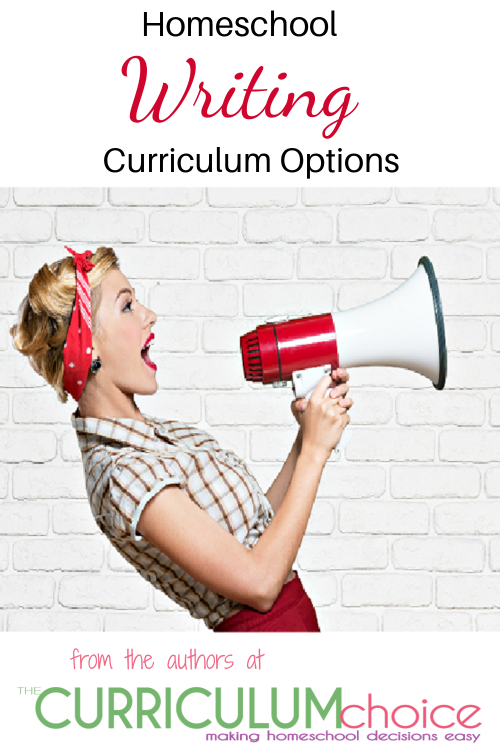
Homeschool Writing Curriculum Options
There are plenty of choices available to home educators when it comes to homeschool writing curriculum. How do you know where to start? What program or system will work for my children?
I have asked myself these questions too many times to count over the past 17 years that I’ve been teaching my kids at home.
But there is hope for you all, because we have a nice line-up of ideas for you here all in one place!
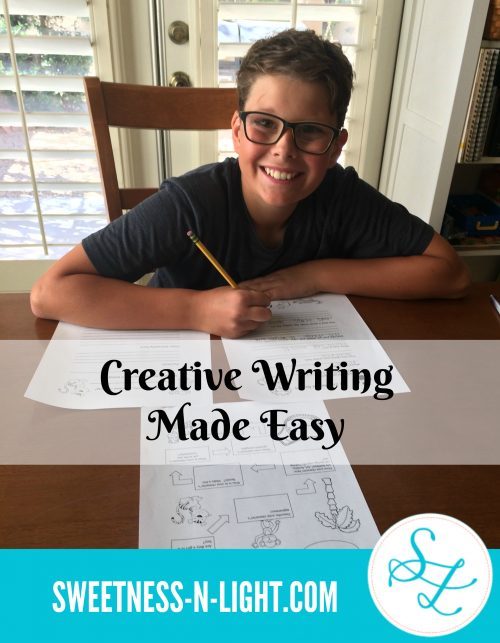
Creative Writing Made Easy – The Zany Zoo Adventures writing guide is packed with information about how to create a whole Zoo City, it has been quite an adventure so far. There are twelve easy lessons with a handout or worksheet to accompany each lesson. The lessons build upon each other for a great final result. Creativity is stressed over the drudgery of grammar, and giving praise all throughout the writing process will propel your student into the writing pool with enthusiasm, and not to mention fun!
Writing & Rhetoric Book 7: Encomium & Vituperation – This is the seventh book in the Writing and Rhetoric series and the first time for us using this program, so I chose to start my new freshman with this level for a bit of review and to introduce him to this style of using rhetoric within the writing process. We are using this program in addition to our regular weekly written narrations, and other writing that I have my freshman do for some of his different subjects. We are finding it to be a a nice balance in our school week.
Why We Love Writing with Ease – The program was created and published in 2008 by Peace Hill Press as part of the growing resources available to parents who enjoy following the teaching ideas set forth in The Well-Trained Mind , also by Susan Wise Bauer. We like to infuse many different aspects of the Classical teaching model into our learning and this series has allowed my elementary and middle school children to gain confidence and necessary skills towards becoming proficient writers, a little at a time.
From The Curriculum Choice Archives
At The Curriculum Choice we have shared tips for homeschool writing curriculum. Be sure to browse the tabs above to find related reviews. You might also enjoy these that we’ve selected from our archives.
- Homeschool Writing Curriculum Reviews all in one spot
- Language Arts Curriculum Reviews
- One Year Adventure Novel
- WriteShop I for ESL Homeschool
- All in One Writing Focused Language Arts Curriculum – Writers in Residence
- Living Literature Grammar Packs
- Nurturing Brave Writers
- National Novel Writing Month – NaNoWriMo – No Plot No Problem
- Essay Rockstar
- Writing & Rhetoric
- AP English (with Alexandra McGee)
Homeschool Writing Curriculum Reviews
The Curriculum Choice authors have active blogs where they regularly offer ideas and experiences about their homeschool adventures. Below are some of their experiences with homeschool writing curriculum.
From Eva at EvaVarga.net
We have been homeschooling since my kiddos were toddlers. We have thereby used a wide range of curriculum materials both available for purchase and materials I have put together myself using free resources I have found online and at the local library.
My children are now in their final years of compulsory education. My daughter is sophomore in high school and taking the majority of her courses at the community college via dual enrollment. My son is entering 8th grade and is yet homeschooling under my tutelage.
Here are a few of our favorite middle school writing resources:
Cover Story Opens Doors and Builds Bridges – Creating their own magazine has been one of the most revered long-term projects in which my kids have taken part. The variety of writing assignments in Cover Story combined with a compelling yet challenging goal of publishing their own magazine have opened doors for future opportunities and built bridges between generations.
Middle School Etymology with King Alfred’s English – History has always been one of my children’s favorite subjects. With King Alfred’s English , my daughter discovered a passion for etymology or the origin of words.
Rediscovering the Lost Art of Parsing: Learn with Diagrams – When the kids were younger, we had done a little diagramming with Writing With Ease and Writing with Skill . However, the programs I had selected for junior high and high school lacked this component. When I discovered Learn with Diagrams, I knew immediately it was just the product I was looking for … challenging, comprehensive, and most of all, fun!
From Tricia at Hodgepodge
With our classical base of Tapestry of Grace, we get weekly practice with writing – of all styles – that matches the topics of our studies. I love how it all weaves together.
Fun Writing with Tapestry of Grace – Yes, I said fun writing. Because the weekly writing assignments (and rest assured, we don’t get to them every week) are different. They are challenging. They are fun. The topics match what we are studying and the grade/age level. All rolled in with what we are studying so it is not such drudgery.
Writing Workshop for Multiple Ages – Sometimes in our homeschool we just need to focus on a certain subject. I’ve mentioned this strategy in When You Need to Catch Up . This week it was writing. So, rather than say, “Children, write!” I decided we would call this week a Writing Workshop. Something about a workshop makes it a little more fun, don’t you think? A workshop implies all sorts of things and reminds me to pull out all the resources.
We’ve had weeks of studies on writing, learning the how tos of journaling, biographies, poetry and essays. And we’ve used both Tapestry of Grace writing assignments and Writing Aids as well as Institute for Excellence in Writing (IEW). The IEW student writing workshops equipped us with new writing skills and ideas. IEW also helped me as the teacher, to see how I can help my children get over a hump, find key words and brainstorm.
Writer’s in Residence – Teaching writing in homeschool can definitely be overwhelming. However, Apologia’s Debra Bell has a brand new curriculum, Writers in Residence, to help with just that. This fantastic resource is not only a homeschool writing resource but a writing focused language arts curriculum. No more overwhelm!
From Heidi at Starts At Eight
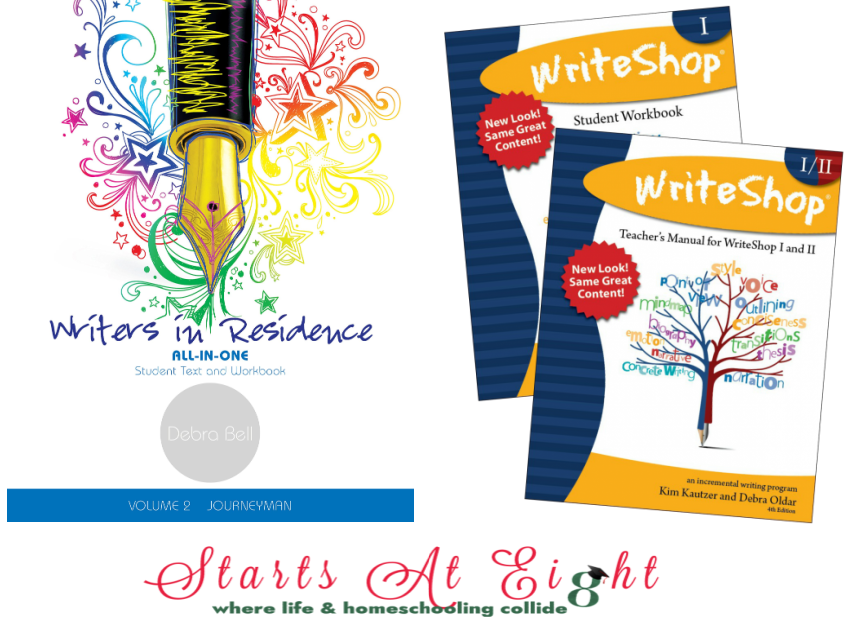
Writers in Residence is still one of my favorite writing curriculum options for late elementary and middle school age kids. The text is spiral bound which makes it so easy to lay flat and use. There are two levels covering various styles of writing, including poetry! There is help for the mom whose teaching it in the form of Suggested Daily Schedules and Grading Rubrics.
WriteShop – As my kids got a little bit older, late middle school into high school, I really oved WriteShop. There are multiple levels with a placement test to help you choose. And beyond the workbooks there is a video component as an add-on if you so desire.
More Homeschool Writing Related Resources
20 top handwriting resources for your homeschool.

20 Top Handwriting Resources – includes both print and cursive options
The Ultimate Guide to Homeschool Language Arts
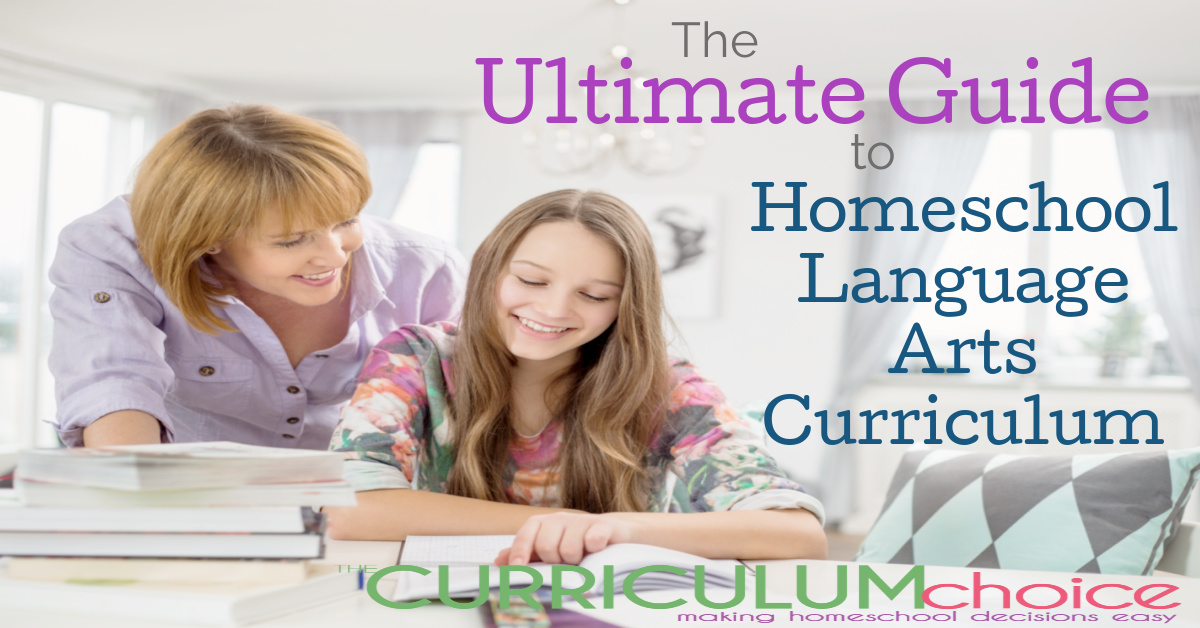
The Ultimate Guide to Homeschool Language Arts Curriculum – Looking for a Homeschool Language Arts curriculum that suits your family’s needs? Need just a spelling or writing program? This list is sure to have what you are looking for! This list contains full homeschool language arts curricula, as well as resources for reading/literature, writing, spelling, grammar and handwriting.
The Curriculum Choice Review Team Features
- Our homeschool writing Pinterest board .
- Have you enjoyed this special post from our review authors? Our Curriculum Choice review team features a topic monthly. You can see all that our authors have shared on electives, math, curriculum choices and more under Review Team Features .
Be sure to SUBSCRIBE so you won’t miss any reviews from our team of veteran homeschoolers!
~ Originally published September 2017, Hosted by Meredith
Meredith Henning, veteran homeschooler of 16+ years, spends her days amongst the chaos of her "fab four" children, including two kiddos already graduated and off to college and two more boys, in middle school and the other a freshman in high school. She is the author of Homeschooling High School It's Not As Hard As You Think and writes about homeschooling, books and the sweet life she shares learning along with her family at Sweetness-n-Light.
Reader Interactions
Leave a reply cancel reply.
Your email address will not be published. Required fields are marked *
Save my name, email, and website in this browser for the next time I comment.
- Clear Water Press
- Writing Programs:
- Cover Story
- One Year Novel
- Other Worlds

Student Journalists Cover Events from History!
A writing curriculum crafted to transform essay writing—from the creators of the one year adventure novel and cover story.
Byline turns students into time-traveling reporters who practice journalism in the forgotten corners of history. Under the video tutelage of Mr. S., editor of the fictional Metropolitan World , your cub reporter will learn more than just how to write a terrific paper. By studying the work of great journalists, students uncover techniques of persuasion and propaganda that are widely used in media today. As students enjoy their reporter’s journey, Byline is teaching them to write essays!

- 72 video lessons on DVD or online streaming
- Self-directed
- Step-by-step guidance
- Parent-friendly
- Intriguing pieces of history woven throughout the lessons
- Grades 9–12

Byline in Three Minutes:

Optional Half-Credit of History Too!
Byline is 1 high school English credit , but with a little extra work, you can also list it for a half-credit of high school History! (Completely optional.)

- About Byline
- The Story Behind Byline
- Cloud Streaming or DVDs?
- How to Use Byline
- Optional 0.5 History Credit
- Syllabus with Lesson Table
- Reviews & Testimonials
- Homeschool Curriculum Conferences
- Sample Lessons
- Witherspoon Award
- Special Contest Newspaper Editions
- Extra! Extra!
- Cloud Video Sign-In
- Assignment Resources
- Student Writing
- Online Unit Tests
- Curriculum Updates
- Good Books List
- Curiosity Saved the Cat
- Ask a Question
- Order Materials for a Group
The Five-Paragraph Essay: What, Why, and How for Homeschoolers
Overview: The five-paragraph essay is a helpful tool — here are ideas for teaching it! Note: Contains referral links.
In one of my articles about high school writing, I shared the story of when my eldest daughter took the ACT and got a poor score on the writing portion. I was flabbergasted at the time. I read the essay myself, and it didn't seem so horrible to me. She had great grammar, vocabulary, and sentence structure — what was their problem?
I have since come to realize that the ACT (and SAT, for that matter) writing scorers are looking for a very particular type of essay — the five-paragraph essay. And no matter how well your child writes, if they don't craft their ACT/SAT essay as a five-paragraph essay, then they are going to get a low score, too. So it's a good idea to get your teen familiar with it before they need to take those tests.

WHAT is a five-paragraph essay?
It is a composition that is written with — you guessed it — five paragraphs: an introduction which states a thesis, then three supporting paragraphs, then a conclusion. So a five-paragraph essay is a persuasive essay, because the writer states an opinion about something and then proceeds to back it up. It follows the standard formula that we've all heard many times: tell 'em what you're gonna tell 'em (introduction), then tell 'em (body), then tell 'em what you told 'em (conclusion).
WHY teach your kids to write a five-paragraph essay?
1) I've alluded to one answer to this question already — your kids will need to know how to craft a five-paragraph essay in order to score well on the writing portions of the ACT and SAT . Do I agree that it seems silly that the scorers can't judge any other type of writing? You bet. Do I understand the myriad problems with relying on test scores for deciding a student's adequacy for college entrance? Totally. I am not here to debate all that stuff today but just to face reality. It is what it is, y'all. Most colleges still require these tests, and if you want scholarship money for your genius, you will want him or her to do well on them.
2) I also have come to believe that the five-paragraph essay is a very valuable tool for teaching writing in general. It is short and doable, so the student feels less intimidated and more motivated. It is also possible to fit a LOT of solid writing education into the formation of a five-paragraph essay — or into several/many of them over time.
Because while it sounds simple, it is actually a little more complicated (ouch! it hurt to use that word! Because you know that I am “too lazy for complicated!”) than just throwing together five paragraphs. Within the essay the student must learn how to execute each paragraph with specific elements and literary techniques. This means that in learning how to create a five-paragraph essay, they can learn how to write WELL. They can then use that skill in all types of writing, whether it be research papers, fictional writing, lab reports, etc. etc.
Having said all this, I think I can predict your next question:
HOW do I teach my kid to write a five-paragraph essay?
In my posts Homeschool High School Writing Help and Homeschool ACT and SAT Practice, I detail what we did to help my second and third high schoolers get a better score on the writing portion of their college entrance exams than their older sister. And they both did — and they will not let her forget it, lol. Check those articles out to see the resources we used for them.
But since starting in Classical Conversations this fall, I have found out that there is another, BETTER way to tame this five-paragraph essay beast, and that is to start earlier than high school . My 12-year-old in Challenge A is learning step-by-step how to write a persuasive essay in the five-paragraph format by using the writing curriculum called The Lost Tools of Writing . And I have to say that I am very impressed with how they do this.
First, LTW uses quality, engaging literature as the basis for the content of the essays the students will write. Students find an issue in the book they are reading and form an opinion about it. This becomes their thesis statement; and events, characters, or themes in the book become their supporting arguments. Can you say “teach them literary analysis without them even realizing it?” :-)
Second, LTW assigns several essays over the course of the year, with each one being more complex than the last. The first essay is nothing more than a skeleton essay. By the third essay they have learned how to construct a thesis and find supporting arguments. Currently (in October) the students are working on finding attention-grabbing opening sentences. They will also gradually add other various literary devices such as parallelism and alliteration, among others.
While LTW is not the easiest curriculum to use (and you know I prefer that they require little prep or effort to understand — can't claim that about this one), I have to say that so far it seems to be a very effective means to teach the five-paragraph essay. Which means that by the time #5 has reached the age to take those nasty tests, she'll have been writing these essays for several years. Which further means that she'll totally blow her sisters' scores out of the water! Muahahaha…
UPDATE: LTW is great for older teens, too
Since writing this, I have seen LTW used successfully with upper high schoolers, as well. It may seem a bit basic at first, but the older students progress faster through the program and are more inventive with how they use the various elements in their essays. I think this curriculum is a great way to get ANY kid in grades 7-12 to feel better about writing.
Another solid option for older teens is WriteShop . This one won't seem like it's talking down to them like LTW might. Both WriteShop I and WriteShop II are amazing for high school writing, but I believe it is WriteShop II that teaches the five-paragraph essay. See my complete review of WriteShop here (includes two videos): WriteShop I & II for High School Writing .
ANOTHER UPDATE:
It's been five years since this article was originally written. The daughter who used LTW in 7th and 8th grade was preparing to take her ACT Written portion for the first time this past spring, and guess what she did? She pulled out her LTW notes! She reviewed the essay structures and the different techniques, and then she took the test.
And my prediction was correct! Her score was a 9, y'all. That's the score that is recommended to aim for in order to get accepted to Ivy Leagues. Yup! She is not going to an Ivy League, but that's how well the Lost Tools of Writing prepared her for that test! Woot!
So even after this many years, I'm still a fan!
- Recent Posts
- The Secret to Finding God's Will for Today - March 25, 2024
- Our Main Reason for Homeschooling: Character Development - January 18, 2024
- Homeschool Transcript Essentials: what you need and DON'T need! - January 13, 2024

- Facebook Messenger
Related Posts

Good Clean Books for Teens – Fiction, Mystery, Christian, Non-Fiction
Overview: It can be hard to find good clean books for teens that are interesting AND appropriate. Here is my list of books I'm not…

How to Help Teens Who are Struggling Spellers
Overview: Contributing writer Sara Dennis shares ideas to help struggling spellers in high school. This can be discouraging for them, but here are several options…

Homeschool Literature Curriculum Options When Your Teen Hates to Read
Overview: Having trouble finding a high school homeschool literature curriculum for your reluctant reader teen? Here are my tips and recommendations. When your teen doesn't…
13 thoughts on “The Five-Paragraph Essay: What, Why, and How for Homeschoolers”
The 5 Paragraph Essay is about the only writing method I remember from my (public) school years =) I remember starting it in middle school. That’s interesting that the ACT/SAT folks are only looking for that kind of essay. Clearly there are other types of writing, but I guess they know that the typical public school student is learning that kind of writing.
WriteWell sounds like a neat program. Thanks for sharing about it!
I don’t remember learning it as an actual format when I was in school — but I don’t even remember them having writing on standardized tests then, anyway… I know I’m dating myself with that statement! LOL. But these days that’s definitely what they expect! Thanks for stopping by, Amy! :-)
Thank you for writing this. I like being prepared and if our children want to go to college, then essays are something I must prepare them for. Really informative post. ?
Writing is such a tricky subject to teach, and these resources have really helped me a lot. Thanks for the comment, Erin! :-)
Please do not teach only this format to students who plan to attend college. It is not appropriate for college-level work. It is a rudimentary format, one that I UN-teach in my freshman composition courses.
What is it the next level up, above the 5 paragraph essay, that would be important to teach in preparation for a college level paper Nathan?
The research paper is probably the next step up. But I’ll confess, my eldest kids never did one of those, either. I have always been very scared of the process of teaching writing, lol. My youngest is doing one in Classical Conversations as part of her 9th grade curriculum, and I am glad about that.
I believe you, Nathan. But you need to preach that to the ACT and SAT people. Until they change their standards, we kinda have to teach this to our kids. I personally think it’s a good first step towards writing longer and more researched papers. But then, yes, it is best to move on from there, and let our kids know that this was only a stepping stone.
As a parent I would love to see any writing corrected instead of just a grade at the top of the paper. If 5 paragraphs is all a busy teacher can handle well with a teaching overload of students, I would rather 5 paragraphs really scrutinzed than no real editing/suggestions at all.
Good point!
Great article. I don’t remember doing much writing at all in high school (40 years ago), but learned enough to score well on the SAT. It wasn’t until I was in college that I even learned the 5 paragraph essay. Once I learned how to write that way, may grades soared in college English classes. May daughter hates writing for school but happily writes fan fiction and publishing it on the web. I suppose I should at least try to teach her to write this kind of essay.
Would you recommend using both WriteShop and LTW over different years? If you picked one or the other, which one would you pick?
I start teaching the 5 paragraph essay in Kindergarten based on The Four Square Writing Method by Judith Gould. It actually just starts with a paragraph in K, but evolves into a 5PE by Grade 2. We share write paragraphs in their journal all year. In 1st grade they definitely have the hang of it and can start writing independently. By the end of 2nd grade, they evolve to 5 paragraphs independently. It’s awesome! Check out her books, they’re great!
Leave a Comment Cancel Reply
Your email address will not be published. Required fields are marked *
This site uses Akismet to reduce spam. Learn how your comment data is processed .

- Privacy Policy
- Request a proposal
- Encouragement
- Extracurriculars
- High School
- Home and Family
- Language Arts
- Seasonal and Holidays
- Special Needs
- Styles and Methods
Easy to Use Homeschool Writing Curriculum for Teaching Practical Writing Skills for High Schoolers
Homeschool writing curriculum choices can run the gamut from creative writing to essay writing. Students can learn a five-paragraph essay format in the hopes of preparing for college. Or they can take creative writing courses where they put their narrative writing skills to work. So what kind of writing course should your student take? Is there a form or method of writing that will benefit them in the long run? And will it be difficult for you to teach high school writing if you’re not a writer?
My high schoolers and I were excited to take a look at a great curriculum that answers these questions. It’s an easy-to-use homeschool writing curriculum that will prepare your student for writing for life with practical skills. (Keep reading for a discount and giveaway!)

Disclosure: I received curricula and compensation for this post. All opinions are always my own.
Common Sense Press offers a high school writing curriculum that will help your kids learn the practical writing skills they’ll need throughout life. This curriculum- Wordsmith Craftsman – is part of their Wordsmith writing series. And it’s an easy-to-use course that your student can use independently to learn writing skills…even if you don’t consider yourself a strong writer.
Why Your Homeschool Writing Curriculum Should Teach Practical Writing Skills
As a mom of two homeschool graduates and a former traditional school teacher, I can affirm that practical writing skills are critical to a child’s future success. Whether you have a student headed to college or one who is starting a career right out of high school, these skills are important.
Students Need to Know How to Use Practical Writing Skills to Organize Their Lives and Days
Yes, we can all use digital tools for planning and organizing now. But should we? Sometimes it helps to be able to write goals and plans out on paper.
Wordsmith Craftsman begins with the basics. In the opening lessons, students are taught how to make lists and how to plan their days. Assignments guide them in setting up a notebook that will help them plan out everyday routines as well as set goals for the future.
Students Need Writing Skills to Get Into College…or Apply for a Job
Sometimes we think about college applications but assume that kids who don’t go to a four-year college won’t need the skill of applying to a college. But applying for a job requires similar skills. Students need to know how to organize their thoughts. And they need to know how to craft a formal letter that introduces themselves.
In the Wordsmith Craftsman curriculum students are taught how to write a business letter. They’re taught how to sound respectful and clear in their writing. They’re specifically taught about what a letter requesting employment needs to include and the style it should be written in.

Students Need to Know How to Take Notes and Paraphrase
These are also skills we sometimes assume are limited to students in college. And students in college certainly need to know this. (I’m constantly surprised when college kids don’t understand that they need to take notes!) But students entering the workforce need to know this as well. They may not be required to write out notes or paraphrase. But they may need to read training materials for a job. And practicing these skills in writing can help them to mentally take notes and summarize information when they’re learning a new skill or getting instructions from an employer.
In the Wordsmith Craftsman curriculum students will learn how to take notes and how to organize that information and paraphrase. They’re taught how to pick out relevant information and how to get the general idea of a long passage of writing. And they are taught that creating a summary can be a good tool to hone comprehension of the material they’ve read.
Students Need to be Able to Communicate Ideas in Writing
Whether or not students end up writing for a grade in a college class, they need to know how to express themselves in writing. Could they explain in an essay why they wanted to attend a certain college or obtain a certain job? Could they write a statement in an online space backing up a belief or opinion? Do they know how to evaluate and edit what they’ve written?
Wordsmith Craftsman teaches students how to start with gathering information, organizing that information, and then writing effectively. The curriculum teaches students about using language effectively. It covers different types of essays. And students learn how to evaluate and edit their writing.

How This Homeschool Writing Curriculum Teaches Practical Writing Skills
The Wordsmith series from Common Sense Press is a writing series that teaches students writing skills from basic to complex. The series includes books for three levels that cover 4th-12th grade. Common Sense Press is often known for its Learning Language Arts Through Literature series . And this writing series is a perfect accompaniment to that literature series. The series begins with the basics of grammar review and then moves to sentence writing, paragraph writing, and essay writing.
Wordsmith Craftsman is intended for 9th-12th graders. The first part of the course covers practical writing. Part two reviews grammar skills and composition skills. And part three covers formal essay writing. Students can begin using the curriculum in 9th grade. Or you can adapt the material to fit into one to three years. The front of the book has a suggested schedule for these different options.
This course is self-paced. It is designed for students to read through the sections and then complete the assignments independently. In the first section when students are learning to make notes and to-do lists the curriculum teaches them how to break up and plan assignments. There are some shorter exercises and then longer assignments as well. Most of the assignments are writing assignments with no right or wrong answers. But there are some exercises in the second section that need to be checked. The Appendix includes answers to these.

Why Wordsmith Craftsman is the Homeschool Writing Curriculum You Need
So why do you need Wordsmith Craftsman in your homeschool? There are a few features I really liked, and I think you’ll love as well.
- This course is self-paced. Homeschooling is all about flexibility . There are a number of different ways that you can pace this course depending on the needs of your student.
- Students can complete the course independently. Are you homeschooling other kids? Cleaning the house? Cooking food? Taking care of little ones? Working from home ? If you are doing any or all of the above, at least your high schooler can work on this course independently.
- This course covers the writing basics that kids will need to know for life as well as for college. Not all kids will go to college. Some high school writing courses focus only on preparing high schoolers for college. Wordsmith Craftsman can help your student with that as well. But students who aren’t headed to college can also learn important skills that will help them in day-to-day writing.
- This writing course isn’t extremely intensive, and it can fit in with your other language arts curricula. The course is specially designed to use in conjunction with Common Sense Press’ literature course. Sometimes I’ve tried a writing curriculum that’s so intensive that it’s hard to use in addition to a literature course that also might have writing. Wordsmith Craftsman avoids that.
Ready to check out Wordsmith Craftsman? You can use code Summer2021 for 15% off through July 31, 2021. You can also enter the giveaway below to win a choice of a literature or science curriculum from Common Sense Press. (See those courses here!)
About the author
Leah Courtney is a former school teacher turned homeschool mom. She has homeschooled her four children since birth and is now the mother of two homeschool graduates. She blogs at As We Walk Along the Road, posting literature-based homeschooling resources and encouragement for other homeschooling mamas. She’s also the author of several ebooks and unit study resources for homeschoolers.
Related Posts @media (min-width: 300px){.tve-theme-28930 .content-section [data-css="tve-u-178215a38ea"].tcb-post-list #post-36966 [data-css="tve-u-178215a38f0"]{background-image: linear-gradient(rgba(0, 143, 255, 0.08), rgba(0, 143, 255, 0.08)), url("https://assets.ihomeschoolnetwork.com/wp-content/uploads/2024/04/05031158/teaching-spanish-in-your-homeschool-mas-spanish-featured-favorite.png") !important;}.tve-theme-28930 .content-section [data-css="tve-u-178215a38ea"].tcb-post-list #post-36966 [data-css="tve-u-178215a38ef"]:hover [data-css="tve-u-178215a38f0"]{background-image: linear-gradient(rgba(0, 143, 255, 0.08), rgba(0, 143, 255, 0.08)), url("https://assets.ihomeschoolnetwork.com/wp-content/uploads/2024/04/05031158/teaching-spanish-in-your-homeschool-mas-spanish-featured-favorite.png") !important;}} Mas Spanish: The Ultimate Homeschool Spanish Solution | Featured Favorite
See why parents love Mas Spanish, the game-changing online curriculum making Spanish learning effortless and engaging for homeschoolers. With a focus on minimal parental involvement, it’s tailored for middle and high school students, offering video lessons, interactive games, and worksheets. This approach transforms Spanish education into a thrilling adventure, empowering students to master the language with joy and ease.
5 Ways Book Clubs Can Inspire Your Homeschool Kids to Read
I started coming up with many different ideas to try to change my children’s way of thinking about reading. I knew they once loved to read. I just needed to get them excited about reading again. Along the way, I discovered five ways book clubs can inspire your kids to read.
Dachelle McVey
How to Create an Author Study for Young Homeschoolers
Create an author study for your young kids! Expose them to great literature and engage them in the process early on in their education.
Leave a Reply
Your email address will not be published. Required fields are marked
Email * * *
This site uses Akismet to reduce spam. Learn how your comment data is processed .

What is the best homeschool writing curriculum for high school?
by Kim Kautzer | Dec 7, 2020 | High school , WriteShop I & II
As homeschool parents, we want our teens to become self-directed, capable writers who are well prepared for college or career. Does that goal sound scary to you? If so, I’ll let you in on a little secret: homeschooling high school doesn’t have to be intimidating!
These days, it’s easy to lay your hands on some great products for teaching core subjects. Even better, you don’t have to be an expert to teach them! You only need to know what to look for.
Let’s start by taking the fear out of finding the best homeschool writing curriculum for your high school student .
A good writing program helps you fill your teens’ tool belts with assorted skills and tools. In the process you get to watch them grow more comfortable with the writing process. With a solid curriculum by your side, you’ll be able to:
- Build on and review writing skills they’ve learned in the past.
- Train them to write clearly, creatively, and effectively.
- Give opportunities for your teens to work more independently.
- Create confident, competent writers.
Top 5 skills to look for in a homeschool writing curriculum for high school
In your quest, look for certain key traits in a solid high school writing curriculum . Whether your teen is a reluctant or confident writer, these five skills should be part of the program you choose.
1. Brainstorming and Organizing
It’s wishful thinking to give most students a blank sheet of paper and expect brilliant results. They need direction first!
Brainstorming is the foundational tool that prepares teens to write a paper. Early in the writing process, brainstorming teaches them to narrow a topic from general to specific. Additionally, it guides them to create graphic organizers and use charts and mind-maps to plan and organize information.
WriteShop I and II incorporate topic suggestions, brainstorming worksheets, and 17 practical word banks to help unlock your student’s creative ideas.
2. Structure
Structuring a writing piece goes much deeper than the hamburger paragraph . Your high schooler’s curriculum should emphasize writing strong topic and closing sentences, developing complex sentences, and using transition words.
Together, these components help high schoolers learn to develop powerful thesis statements and write multi-paragraph essays —both necessary for students who want to go to college.
3. Composition Writing
Think of composition writing as the “meat” of the writing process. This is where students discover creative writing and learn to write original descriptive narratives. They’ll explore how to start sentences in different ways, use active voice , and write concisely .
WriteShop I and II ensure that students use concrete, descriptive vocabulary and develop a writing voice that shows emotion.
4. Nonfiction and Essay Writing
Writing nonfiction teaches students to differentiate between fact and opinion . Informative articles and expository, argumentative, or persuasive essays become the focal point of their pieces. They’ll understand and practice including an introduction, body, and conclusion to create a well-rounded piece of written work.
Because learning to write a basic five-paragraph essay is an important step to becoming a confident writer, WriteShop II guides students through the process step by step.
5. Editing and Revising
At this age, editing and revising happen in two stages.
✏️ Student Self-editing
Self-editing and revising their own work, one of the most valuable skill sets for high schoolers, bridges everything they’ve learned thus far.
WriteShop I and II guide your teens through this process as they follow objective, lesson-specific checklists to proofread for content , style , and mechanics . During the self-editing process, they learn to rely on a good thesaurus to replace weak or repeated words and to use standard proofreading symbols to correct their work.
✏️ Parent Editing and Evaluating
The editing process can be just as daunting for parents as for students. However, with WriteShop’s objective checklists and grading rubrics , you’ll know exactly what to look for as you review your teen’s work. In addition, the Teacher’s Manual contains lots of examples, troubleshooting tips, and more to help you edit and grade fairly and confidently .

Why WriteShop makes the best curriculum choice for teaching writing to your high schooler
Not only do WriteShop I and II cover each step of the writing process, but the program is packed with tools to help teach students how to brainstorm, write, and self-edit. Through the “learn-practice-do” approach, new skills become comfortable habits.
Parents particularly appreciate the way WriteShop lessons present new concepts. Writing skills are:
- Introduced during Skill Builder exercises.
- Practiced and applied in the current composition.
- Revisited in future compositions.
Additionally, WriteShop focuses on clarity, conciseness , colorful vocabulary, and sentence variety that add sparkle to dull, ordinary compositions. Lessons are laid out incrementally. This step-by-step approach means your student can confidently move past writer’s block , overcome pencil-to-paper insecurities , and see their progress.
Finally, WriteShop is easy for homeschool parents to teach . Having an open-and-go curriculum takes the stress out of what to do each day. You’ll appreciate the schedules, lesson plans, editing tips, and answer keys. Parents love seeing their teen’s faces light up when they’ve mastered a writing concept. When you see your kids thriving, you get a confidence boost in your ability to teach .
What’s included in WriteShop’s high school writing curriculum?
Basic curriculum.
While you can certainly purchase the books à la carte, most parents choose the WriteShop I & II bundle . The bundle includes:
- Teacher’s Manual for WriteShop I & II
- 1 WriteShop I Student Workbook
- 1 WriteShop II Student Workbook
The Teacher’s Manual features a softcover, plastic-coil binding with sturdy tabbed dividers. Because student workbooks are consumable, you’ll need to purchase one for each of your teens. Alternatively, you may duplicate certain pages according to WriteShop’s copyright policy.
Workbooks come packaged in a paperback cover with loose-leaf pages. Pages are 3-hole punched and ready for your own binder.
Optional resources
In addition to your basic curriculum, consider these helpful resources to use along with WriteShop I & II
- Copying and Dictation Exercises for WriteShop I
- Analytical Grammar (grammar curriculum for grades 6+)
- Blue Book of Grammar and Punctuation
- Proofreading Marks Printable (free download)
- The Synonym Finder (our favorite thesaurus)
WriteShop I & II: Which level is right for my student?
Grade 9: Younger teens who are new to the program should always begin with WriteShop I . This book lays a solid foundation in paragraph writing and gives plenty of experience with descriptive, informative, and narrative compositions.
Grade 10: Sophomores can go into either level, especially since WriteShop II starts off with a review of WriteShop I . Both reluctant and motivated high schoolers show dramatic improvement in their ability to write clearly and concretely using this curriculum.
Grades 11-12: Juniors and seniors usually jump right into WriteShop II . But some 11th and 12th graders find their footing using WriteShop I first. It establishes core writing habits that prepare them for WriteShop II, where they’ll learn about advanced descriptive narration, point of view, narrative voice, and essay writing.
>> View WriteShop I & II scope and sequence >> Download a chart comparing skills covered in each level

No matter what kind of learner you have , teaching writing can be intimidating or overwhelming. Even if you’re a writer, it doesn’t automatically mean you know how to teach writing. Putting words on paper might be second nature to you. But how do you pass on what you know and love to a child who hates it? WriteShop understands the challenges of teaching high school writing to homeschoolers. That’s why we’ve created materials that teach your teens how to write—and show you how to teach. We’re confident you’ll find it’s the best homeschool writing curriculum for high school. You and your kids will love WriteShop I & II !
Placement help
When you’re unsure which book to settle on, use the placement quiz along with this helpful WriteShop I & II placement guide . Together, they’ll guide you to choose the best starting level for your teen.
Let’s Stay Connected!
Subscribe to our newsletter.

- Gift Guides
- Reluctant or Struggling Writers
- Special Needs Writers
- Brainstorming Help
- Editing & Grading Help
- Encouragement for Moms
- Writing Games & Activities
- Writing for All Subjects
- Essays & Research Papers
- College Prep Writing
- Grammar & Spelling
- Writing Prompts
Recent Posts
- An exciting announcement!
- 10 Stumbling Blocks to Writing in Your Homeschool
- Help kids with learning challenges succeed at homeschool writing
- How to correct writing lessons without criticizing your child
- Skip to primary navigation
- Skip to main content
- Skip to footer

Essentials in Writing
Where learning to write well has never been so easy
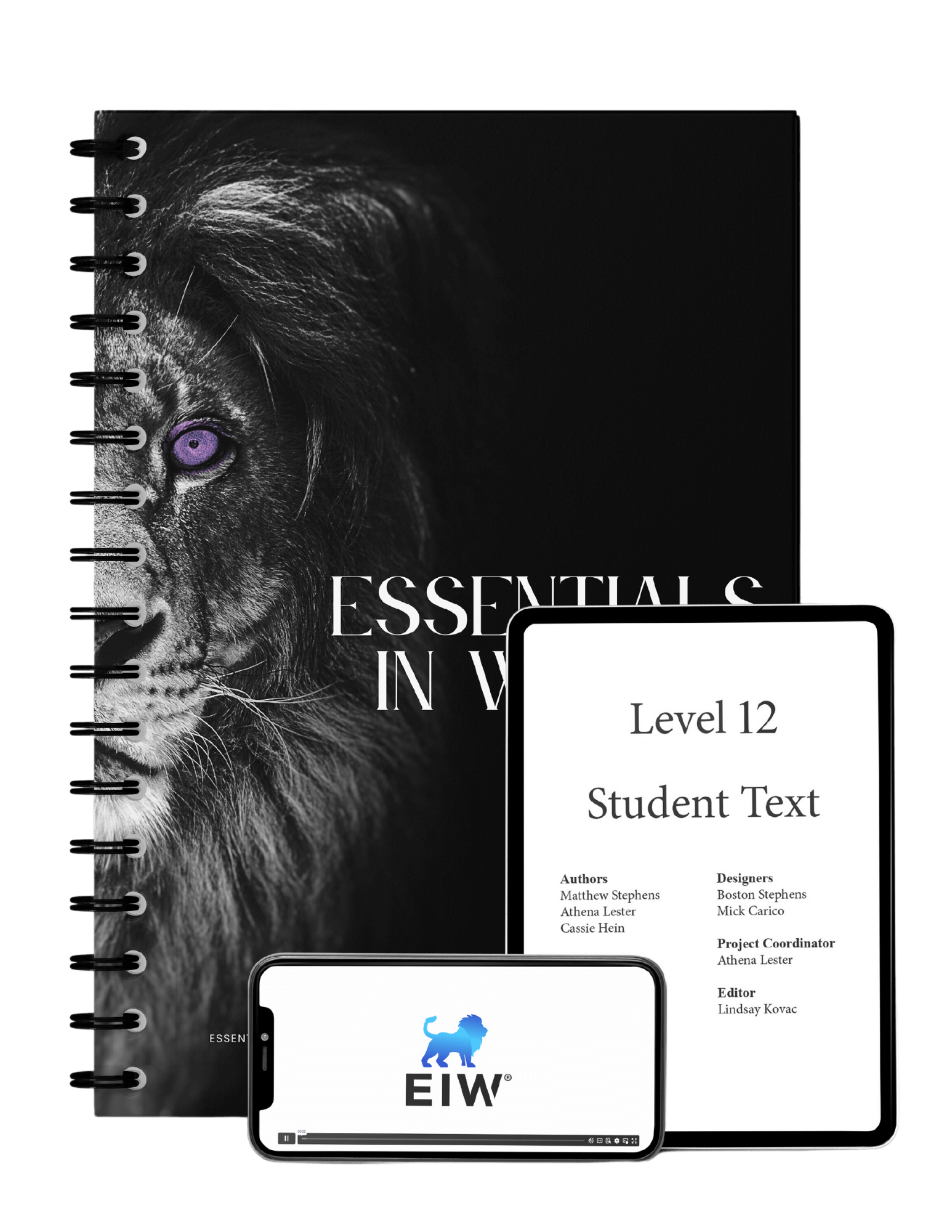
Essentials in Writing Level 12
EIW™ Level 12 is a homeschool writing curriculum that provides high school students the writing skills needed for high school and university writing, the SAT, college prep, the college application process and beyond. Our online writing curriculum is designed for high school students preparing for college and uses a very easy and straightforward approach to writing. EIW lessons are clearly planned out and are relatively self-contained within the workbook and the online video lessons.
Order replacement textbooks & assessment resource books
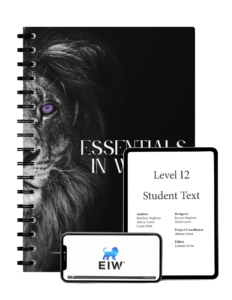
- Writing Student Book
- Video Lessons

English Bundle
Writing and literature, coming date tbd, customize your package.
Includes: all online videos on DVD for offline remote viewing if needed
Add Scoring Service
Level 12 Scoring for 2024-2025
Add Additional Writing Textbook
Add Additional Printed EIW12 Textbook
Package Total $ 0
Don't forget
Customers often also purchase
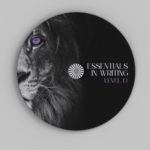
Scoring Service
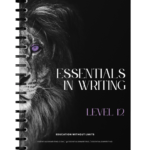
Additional Writing Textbook
Our online writing curriculum is designed for high school students preparing for college and uses a very easy and straightforward approach to writing.
CORE FOCUSES
- SENTENCE STRUCTURE – Dependent and Independent Clause; Simple, Compound, complex, and Compound-Complex Sentences; Address Sentence Errors (Fragment, Run on, Comma Splice) and Appositives
- FORMAL PARAGRAPH – Structure; Expository, Persuasive, Compare/Contrast, Descriptive, and Cause/Effect Paragraphs
- THE WRITING PROCESS – In Depth Study of Each Part of the Writing Process; Practice the Writing Process with Each Multi-Paragraph Composition
- ESSAYS (Formal and Informal) – Detailed Instruction and Step by Step Process for Expository, Persuasive, Compare/Contrast, Literary Response Essays along with Timed Essay (College Prep)
- RESEARCH PAPER (Project) – Detailed Instruction and Step by Step Process to Conduct and Write a Research Paper (PERSUASIVE)
Sample Lesson Video – Level 12
Level 12 – Sample PDFs
- LEVEL 12 TEXTBOOK SAMPLE
- LEVEL 12 34-WEEK SAMPLE
- Alternative Instructional Strategies – PDF
Frequently Asked Questions About Level 12 Writing Curriculum
How old are 12th level students.
The general age for students completing Level 12 is 17 or 18 years old. The age can vary depending on if a child has started school early, on time, or is repeating a grade. The age of the student does not delegate if a child can complete this writing course. Instead, we recommend that students have a basic understanding of spelling, grammar, sentences, composition, and the skills taught in Level 11 before beginning.
What is taught in Level 12?
At Level 12, students are headed for college or the professional world and are well on their way to being skilled writers. Sentence structure is the most technical aspect of Level 12, but any remaining bad habits need to be ironed out before students move into the next stage of their lives. Formal paragraphs and essays (descriptive, expository, persuasive, compare/contrast, cause and effect) will have detailed instructions. Level 12 also includes literary response essays as well as a timed essay for college prep and a persuasive research paper as capstone assignments.
What is included in the Textbook and Scoring?
The Textbook helps the student follow along with the video lessons and complete lesson activities.
The Textbook includes:
* Lesson content that accompanies the video lesson
* Lesson activities that accompany the video lesson
* Writing graphic organizers that accompany the video lesson
* How to use the program
* Sample lesson planning
* Sample answers for each lesson (written as samples in the textbook)
The Essentials in Writing Scoring Service is an optional add-on service that takes the scoring burden off your mind! Our Scoring Team includes a variety of qualified individuals, including long-time educators, librarians, and professionals with Bachelor’s degrees in English, and they are ready to take the burden of grading compositions away from you.
Parents of students completing Levels 7, 8, 9, 10, 11, or 12 of Essentials in Writing are eligible to purchase this service.
Offered from September 1 to June 15 of each school year, one composition for each EIW assignment may be submitted for scoring. If purchased after the September 1 start date, services still expire on June 15 of the following year.
The scoring system includes:
* One final composition from each composition lesson of Essentials in Writing may be presented for scoring.
* Students receive a rubric with a score as well as a one-paragraph write-up from their scorer complementing strengths and sharing areas to improve, plus, detailed comments and suggestions within the composition.
* Scoring Services will be conducted online through Canvas by Instructure.
Can I grade my student papers myself?
Yes. Essentials in Writing provides both scoring checklist and rubrics for your convenience as well as effective and ineffective composition samples for each composition.
What if I have multiple students?
Additional 12th level writing workbooks can be purchased to provide a workbook for another child/student. The workbook does not have additional information and is just another core workbook for another student so that each student has their own workbook to use.
Does each course come with worksheets and tests?
The textbook provides students and parents/teachers with effective and ineffective composition samples. There are no worksheets or tests.
How much time will students need to complete this course?
The time needed to complete the 11th level writing curriculum is a typical academic year (34 weeks). If students follow the 34-week plan included, they will complete individual lessons and activities during the week; however, because the lessons are broken up into small, daily mini-lessons, students can double up on some lessons and activities and complete the entire course sooner. Each day, students will spend 15-40 minutes on writing.
Does the workbook include a daily/weekly program planner?
Essentials in Writing Level 12 includes a 34-week suggested, yet optional, program planner geared for college prep level writing.
Is online help available for additional workbook questions?
Essentials in Writing offers 100% free curriculum support through texting, Facebook Messenger, online chat, email, and phone calls.
How can I assess their proficiency?
By purchasing the scoring service add-on, parents/teachers will receive the necessary feedback from scorers to determine proficiency in writing.
Can a different high school level of Essentials in Literature be used for level 12 since Level 12 has not been released yet?
Yes, a different level of Essentials in Literature can be used for the literary component of the English credit of 12th grade.
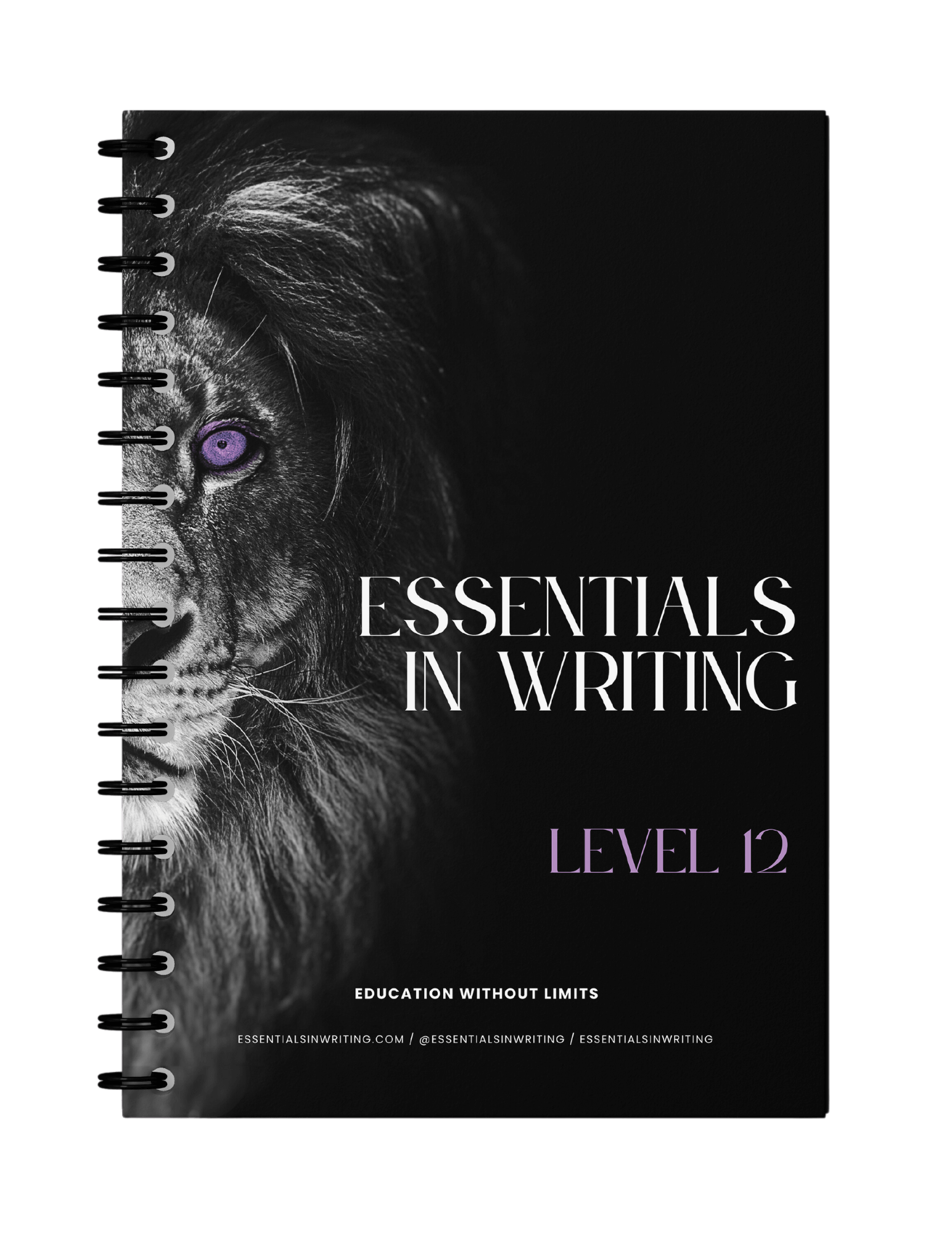
The Difference Between Digital and Print Textbook/Workbook
The online version of the curriculum includes all of the required materials for completing a level of Essentials in Writing or Essentials in Literature, but in a digital format. With the online version, all of your materials are in one spot within the member’s dashboard for you to view and print!
The required online materials include:
- Student Workbook/Textbook
- Lesson Videos
- Teacher Handbook (EIW Levels 1-8 and EIL 7-9)
For EIW Levels 1-8, you can get a digital Assessment/Resource Booklet as well!
How does this compare to the print version? The print version of the curriculum includes all the online access to the digital materials AND the printed, physical, tangible version of the textbooks. The printed books are great for students who prefer to complete their assignments directly within an organized, bound book.
It simply comes down to personal preference. Now, families have the added convenience of being able to access their materials in different formats.
Additional Student Level Textbook/Workbook
Additional Workbook is compatible only with second edition Essentials in Writing video instruction. This is only a Student Workbook for an ADDITIONAL student using the same level of video instruction. Please note that the Workbook is not functional without the related video instruction.
About The Scoring Service
Let Essentials in Writing take the scoring burden off your mind! Our Scoring Team includes a variety of qualified individuals, including long-time educators, librarians, and professionals with Bachelor’s degrees in English, and they are ready to take the burden of grading compositions away from you.
Parents of students completing levels 6*, 7*, 8*, 9, 10, 11, or 12 of Essentials in Writing are eligible to purchase this service. (*Second Editions only.) Offered from September 1 to June 15 of each school year, one composition for each EIW assignment may be submitted for scoring. If purchased after September 1 start date, services still expire on June 15 the following year.
How Do The Scoring Services Work?
- Available from September 1 to June 15 (one school year).
- One final composition from each composition lesson of Essentials in Writing may be presented for scoring.
- Students receive a rubric with a score as well as a one-paragraph write-up from their scorer complimenting strengths and sharing areas to improve, plus, detailed comments and suggestions within the composition.
- Scoring Services will be conducted online through Gradient, Essentials in Writing’s online grading platform.
PLEASE NOTE: Scoring services are for Essentials in Writing only and are not eligible for unconditional money back guarantee.
Read More About Our Scoring Service
Essentials in writing comes with online streaming video instruction.
- ONLINE STREAMING 12 month access to ONLINE lesson-by-lesson video instruction (Free renewals upon request)
- DVD DVD video lessons can be added for $25.00 plus shipping (This includes access to online streaming as well)
Try it Free!
Try it Now!
Not sure which level is right for your student? Use the level wizard .
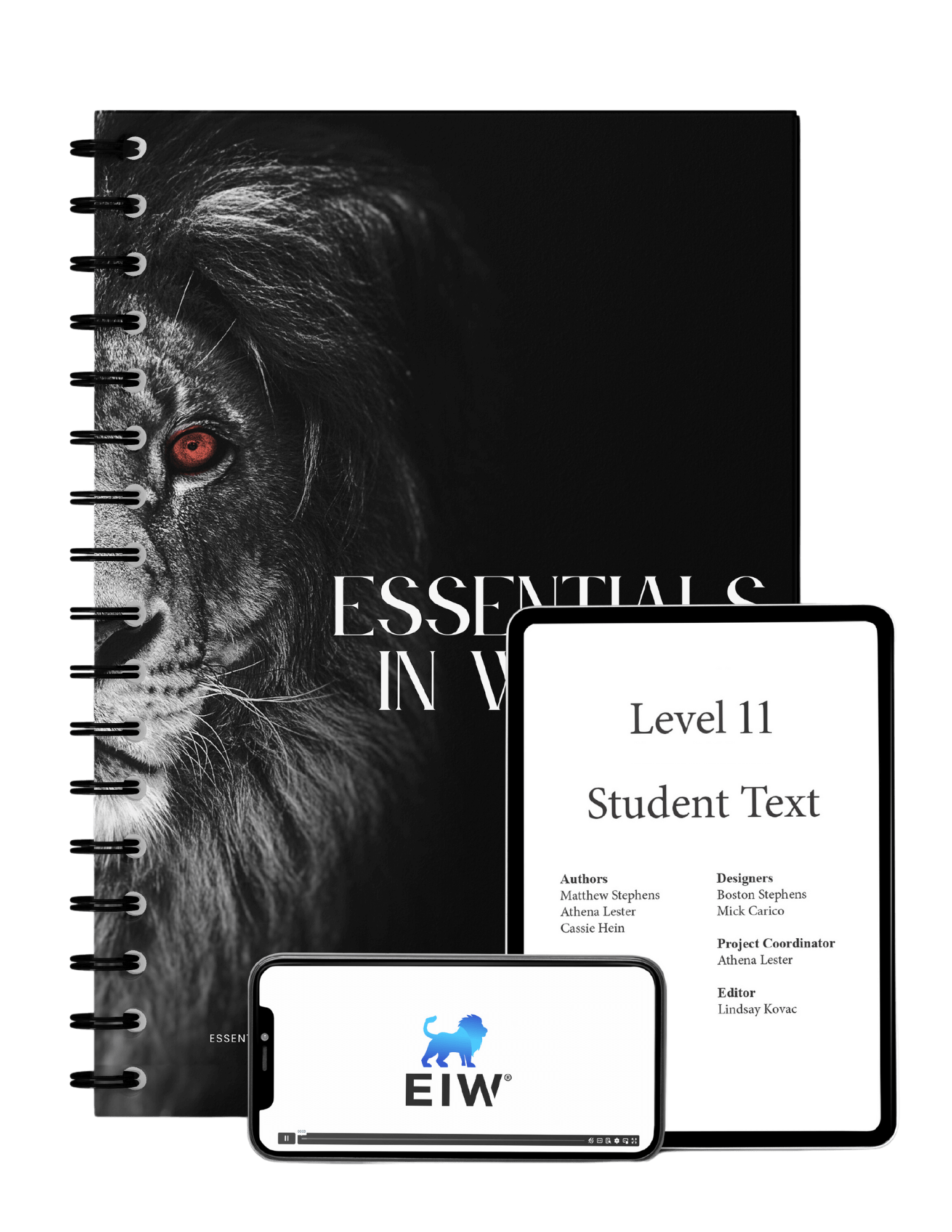
Recommended ages 16-17

Writing Courses
- Level 1 (ages 6-7)
- Level 2 (ages 7-8)
- Level 3 (ages 8-9)
- Level 4 (ages 9-10)
- Level 5 (ages 10-11)
- Level 6 (ages 11-12)
- Level 7 (ages 12-13)
- Level 8 (ages 13-14)
- Level 9 (ages 14-15)
- Level 10 (ages 15-16)
- Level 11 (ages 16-17)
- Level 12 (ages 17-18)
Literature Courses
- Level 7 (ages 12–13)
- Level 8 (ages 13–14)
- Level 9 (ages 14–15)
- Level 10 (ages 15–16)
Other Services
- Scoring Services
- Frequently Asked Questions
- Home School Resource Center
- Supplemental Writing Program (18-week plan)
- Summer Writing Program (10-week plan)
- Charter Schools
- Homeschool Heroes
- Giving Back
- International Customers
- Terms of Use

(417) 256-4191
Top 10 Homeschooling High School Writing Curriculum Choices For 2021
Writing is very personal. When we share our efforts, we are hoping to evoke an emotion, stir a reaction, and touch your life in some way. Ignore the glaring misspellings and dangling participles for now. Simply enjoy what your child has to offer.
We have asked some Teach Them Diligently families what their favorite High School Writing curriculums are. Those are listed below with a link to our complete Homeschool Family Favorite Guide.
The Top 3…
Institute for Excellence in Writing – From their website: At the Institute for Excellence in Writing, we train teachers to model an oral and written pathway of communication which develops the language skills of all students through imitation to innovation. Because every teacher can use the method in his or her classroom, every parent can be confident that every student can learn to listen, speak, read, write, and think effectively and eloquently.
Memoria Press Classical Composition – From their website: Memoria Press’ composition program, Classical Composition, is based on the original classical method of teaching writing called the “progymnasmata.” It was the program that produced John Milton and William Shakespeare. This method involved learning fourteen skills, organized from the simplest and most basic to the most complex and sophisticated. In addition, our English Grammar Recitation program will solidify the grammar your child has learned in Latin through memorizing and reciting the essential grammatical and usage rules in English.
BJU Press Grammar and Writing – From their website: Few skills are more essential today than effective communication. Help your children sharpen the tools of language use–writing and grammar skills. Your children’s analytical abilities will grow as they expand their vocabulary and learn to use words in context. They will learn how to read literature in the light of biblical truth and how to deal biblically with objectionable elements. BJU Press Literature teaches an appreciation for literary techniques in Scripture, presents a variety of genres from a range of cultures, and develops critical thinking skills.
Top High School Writing Curriculums 4-5
4. One year Adventure Novel – From their website: Through 78 video lessons, the One Year Adventure Novel guides high school writers (9th – 12th grade) step by step in creating an original, fully-structured adventure novel—in one school year (two semesters
5. Writing with Ease From Well-Trained Mind – From their website: Susan Wise Bauer’s writing instruction book, newly revised and updated, is part I of The Complete Writer series, a curriculum helping you to take charge of your child’s writing skills now
Top High School Writing Curriculums 6-10
6. Gather Round Homeschool
7. Lost Tools of Writing
8. Writing Skills for Today
9. Sharron Watson Resources
10. Writers in Residence
Sign up to download your free curriculum guide today!
Lizzie Gray Fritz
Leave a reply cancel reply.
You must be logged in to post a comment.
Sign up for Updates
Event Details
Homeschool Tools
Curriculums

7sistershomeschool.com
Homeschool Help and Curriculum
Home » Homeschool Curriculum » High School English » Essay Writing Curriculum
Homeschool Curriculum Category: Essay Writing Curriculum
Essay Writing Curriculum from 7Sisters helps middle school and high school students master important skill. Step-by-step, day-by-day, no busywork, you-can-do-it essay writing guides. We start tweens out with the Middle School Essay Writing Guide. Then high schoolers work through one 10-week guide per year with the Introductory, Intermediate and Advanced Essay Writing Guides. College-bound teens will appreciate working through the College Essay Writing Guide during the fall of senior year. We recommend downloading Grammar Granules to help your homeschoolers stay on track with their grammar. Essay writing may not be loads of fun but the skills are useful for real-life as well as success in school. RETURN POLICY: 10 day, no-questions-asked, money-back guarantee on all 7Sisters ebook curriculum.

01 – Start Here -Which ELA Curriculum Bundle is Right for YOU?

Advanced Guide to High School Essay Writing 2022 edition

Grammar Granules – Essential Elements of English

Guide to Writing a College Application Essay

High School Guide to Senior Year Writing

Intermediate Guide to High School Essay Writing 2022 Edition

Introductory Guide to High School Essay Writing

Middle School Guide to Essay Writing

Tips for Grading Writing FREEBIE

We make teaching writing easy and enjoyable.
Our materials provide clear, step-by-step instructions for teachers and students, making the process of learning to write effective and enjoyable.

Just like the stories above, we can help you too.
It's easy to get started!

It's easy to get started
How to Get Started with IEW

Interested?
Let's get started, what people are saying.

What a Difference!
My son went from not putting anything on paper to being able to utilize the skills and structure that he got from IEW to writing papers sometimes longer than what's required. All I have to do is check the grammatical errors!

All-time Favorite Curriculum!
I noticed improvement in my kids' writing almost immediately. No more whining from my kids means it's a win for me and them!

Provides Strategies That Work
Writing is not an easy subject to teach well, but IEW provides simple and easy-to-use strategies that support the teacher in her instruction. Before students realize it, they are writing!

Proven Methods That Work
Don't spend a lot of money on curriculums that will come and go. IEW has proven methods.

Fun and Easy to Use
I used IEW materials with all of my kids. Each of them was a different type of student. I found that the material was useful and effective for each of their different learning styles and temperaments. I found it fun and easy to use and very interactive. We have many great memories of leaning over rough drafts and laughing about stories!
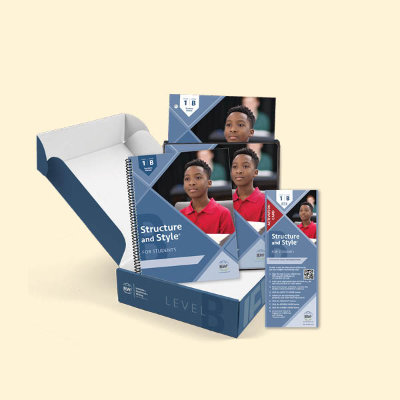
Challenging but Not Overwhelming
Not a question but a big thank you! This is our first year homeschooling our 6th grade son. This writing class has been terrific! Mr. Pudewa does a great job of teaching and keeping my son engaged. So far, the workload has been just right. It’s challenging but not overwhelming! Many, many thanks!

Piece of Cake
I started using IEW in 2018 in my homeschool with my now twenty-year-old son. He wrote circles around all the others in his first-year college writing courses. He is in the top 10% of his college class and received an invitation (nominated by his writing instructor) to join Phi Theta Kappa honor society. My son has told me that he was so glad I had him take all those IEW courses throughout his middle and high school years because it has made college writing a piece of cake. We are continuing the IEW journey with our now seventh-grade daughter and eighth-grade son. Thank you!
100% Satisfaction Guarantee
We offer a 100% satisfaction, no time limit guarantee on everything we sell.
The hardest thing is just doing it. Simply sit down, push play, and start learning!
– Andrew Pudewa
Free Downloads
Reaching the reluctant writer.
Remove the problem of what to write, and you will be free to learn how to write.
Nurturing Competent Communicators
Learn the two most critical things needed for a high level of aptitude in writing.
Four Deadly Errors of Teaching Writing
Avoid four teaching mistakes that contribute to frustration about writing assignments.
Free Language Arts Lessons
Try three FREE weeks of language arts instruction!
Don't wait any longer. Get started today! Get Started

IMAGES
VIDEO
COMMENTS
Writing Doesn't Have to be a Struggle. The Write Foundation is a homeschool writing curriculum developed to equip students with the tools to quickly organize and compose sentences, paragraphs, and essays with confidence. Lessons break down writing into bite-sized pieces so students confidently move step-by-step to complete their writing ...
WriteShop Junior (ages 8-13) can pick from a number of things or bundle them all together: activity pack, teacher's guide, fold-and-go grammar guide, and time-saver pack. WriteShop 1 & 2 (Middle School/High School) requires a student workbook, teacher's guide, and dictation/copy work guide. Price: $41 - $110.
Considered a best homeschool writing curriculum, EIW is featured in Cathy Duffy's Top102 Picks! Free Parent/Teacher Support Any time you have a question while working through the curriculum, you can call customer service, submit a ticket to the curriculum team, or schedule a call with one of our teachers.
Presented in a 10-week, 4 days per week, format these downloadable pdf guides will teach your homeschooler the steps to writing a coherent essay including: -Basic essay format. -Persuasive essays. -Literary analysis. -Compare/contrast essays. -Editorials/letters to the editor. -Tips for taking a short-answer essay test)
It emphasizes creativity and individuality, incorporating various elements of language arts such as grammar, spelling, literature, and writing. This curriculum is by far the most popular one with Prisma parents! Grade Levels: Pre-K to 12th grade. Cost: Individual online classes range from $99 to $199 per course.
Winning With Writing is a secular homeschool writing program designed for grades 1 to 8, corresponding to each grade level. The curriculum is structured based on a 36-week school year, with each week consisting of five separate daily lessons. The program covers various writing aspects, including direct and indirect quotations, dialogue ...
Komodo Math and Language Arts. Night Zookeeper (online writing and language arts) NotebookingPages.com. Play by the Rules. Sound Speech: Public Speaking & Communication Studies. Taxonomy of Living Things: The Five Kingdoms. Cathy Duffy reviews homeschooling resources for Composition and Grammar.
Top 5 High School Writing Curriculums. IEW. Easy Grammar. Analytical Grammar. Jensen's Grammar. BJU Press Grammar & Writing. Research papers, essay writing, grammar, and communication are several of the critical writing skills that are learned in high school.
Our 2020-21 Writing Curriculum for Middle and High School. A flexible, seven-unit program based on the real-world writing found in newspapers, from editorials and reviews to personal narratives ...
Writer's in Residence - Teaching writing in homeschool can definitely be overwhelming. However, Apologia's Debra Bell has a brand new curriculum, Writers in Residence, to help with just that. This fantastic resource is not only a homeschool writing resource but a writing focused language arts curriculum. No more overwhelm!
A writing curriculum crafted to transform essay writing—from the creators of the One Year Adventure Novel and Cover Story! Byline turns students into time-traveling reporters who practice journalism in the forgotten corners of history. Under the video tutelage of Mr. S., editor of the fictional Metropolitan World, your cub reporter will learn ...
WriteShop is a homeschool high school writing option that is VERY user-friendly. It helps your teen work on the writing process step-by-step, and it also provides a LOT of support for whoever is doing the grading (that's you, mom!). WriteShop provides a rubric (i.e., grading checklist) for each assignment, so there is no more guessing about how ...
Overview: The five-paragraph essay is a helpful tool -- here are ideas for teaching it! Note: Contains referral links. In one of my articles about high school writing, I shared the story of when my eldest daughter took the ACT and got a poor score on the writing portion. I was flabbergasted at the time. I read the essay myself, and it didn't seem so horrible to me.
Wordsmith Craftsman is intended for 9th-12th graders. The first part of the course covers practical writing. Part two reviews grammar skills and composition skills. And part three covers formal essay writing. Students can begin using the curriculum in 9th grade. Or you can adapt the material to fit into one to three years.
Top 5 skills to look for in a homeschool writing curriculum for high school. In your quest, look for certain key traits in a solid high school writing curriculum. Whether your teen is a reluctant or confident writer, these five skills should be part of the program you choose. 1. Brainstorming and Organizing.
Help your students master the art of writing essays with workbooks, software, and curriculum for homeschool students ... Homeschool; Writing Curriculum; IEW's Elegant Essay Writing Lessons. Add To Cart Add To Wishlist. The Elegant Essay Writing Lessons: Building Blocks for Analytical Writing, Third Edition. Lesha Myers.
EIW Level 9 provides high school students who are now homeschooling with the writing skills needed for high school and university writing, the SAT, college applications, and beyond. Essentials in Literature is a high-school literature curriculum focused 100% on teaching students how to analyze fiction, nonfiction, poetry, and figurative language.
EIW™ Level 12 is a homeschool writing curriculum that provides high school students the writing skills needed for high school and university writing, the SAT, college prep, the college application process and beyond. Our online writing curriculum is designed for high school students preparing for college and uses a very easy and straightforward approach to writing.
Top High School Writing Curriculums 6-10. 6. Gather Round Homeschool. 7. Lost Tools of Writing. 8. Writing Skills for Today. 9. Sharron Watson Resources.
Essay Writing Curriculum from 7Sisters helps middle school and high school students master important skill. Step-by-step, day-by-day, no busywork, you-can-do-it essay writing guides. We start tweens out with the Middle School Essay Writing Guide. Then high schoolers work through one 10-week guide per year with the Introductory, Intermediate and ...
Piece of Cake. I started using IEW in 2018 in my homeschool with my now twenty-year-old son. He wrote circles around all the others in his first-year college writing courses. He is in the top 10% of his college class and received an invitation (nominated by his writing instructor) to join Phi Theta Kappa honor society.
We've been teaching writing online since before it was cool—23 years! Over 30,000 students have studied with us from 191 countries! Classes are 3-6 weeks long. Choose what works for you! No secret add-on costs. No special software, books, or video. Classes enroll and run on a rolling basis.
WriteAtHome exists to support families by helping students reach their writing potential and develop a love for literature, language, and history. Writing Courses. Asynchronous. Grades 6-12. With WriteAtHome, you can be confident your students are getting the instruction, practice, and coaching they need to become capable, college-ready writers.